Royal Caribbean Blog Podcast Episode - NCL has a new CEO and it's not we expected
In:There's a big shakeup happening at Norwegian Cruise Line Holdings and it's surprising, to say the least.
Share with me your thoughts, questions and comments via...
There's a big shakeup happening at Norwegian Cruise Line Holdings and it's surprising, to say the least.
Share with me your thoughts, questions and comments via...
For three nights, I woke up every morning to the feeling of vibrations as my cruise ship maneuvered into port. I pressed the automatic window shade to see the view of which Bahamian port we were in and take in the beautiful scenery.

I was aboard my sixth cruise on Royal Caribbean's Utopia of the Seas, which is one of the biggest ships in the world. It's still very much a new ship and because it offers short weekend cruises, it's become my preferred weekend escape mechanism.
During my three night voyage from Port Canaveral, Florida, we sailed to Nassau, Bahamas and and Royal Caribbean's private island in the Bahamas.
I stayed in an ocean-view stateroom on deck nine for $685. The cruise was offered as a "free sailing" through the casino loyalty program. Take a look inside the 187-square-foot space.
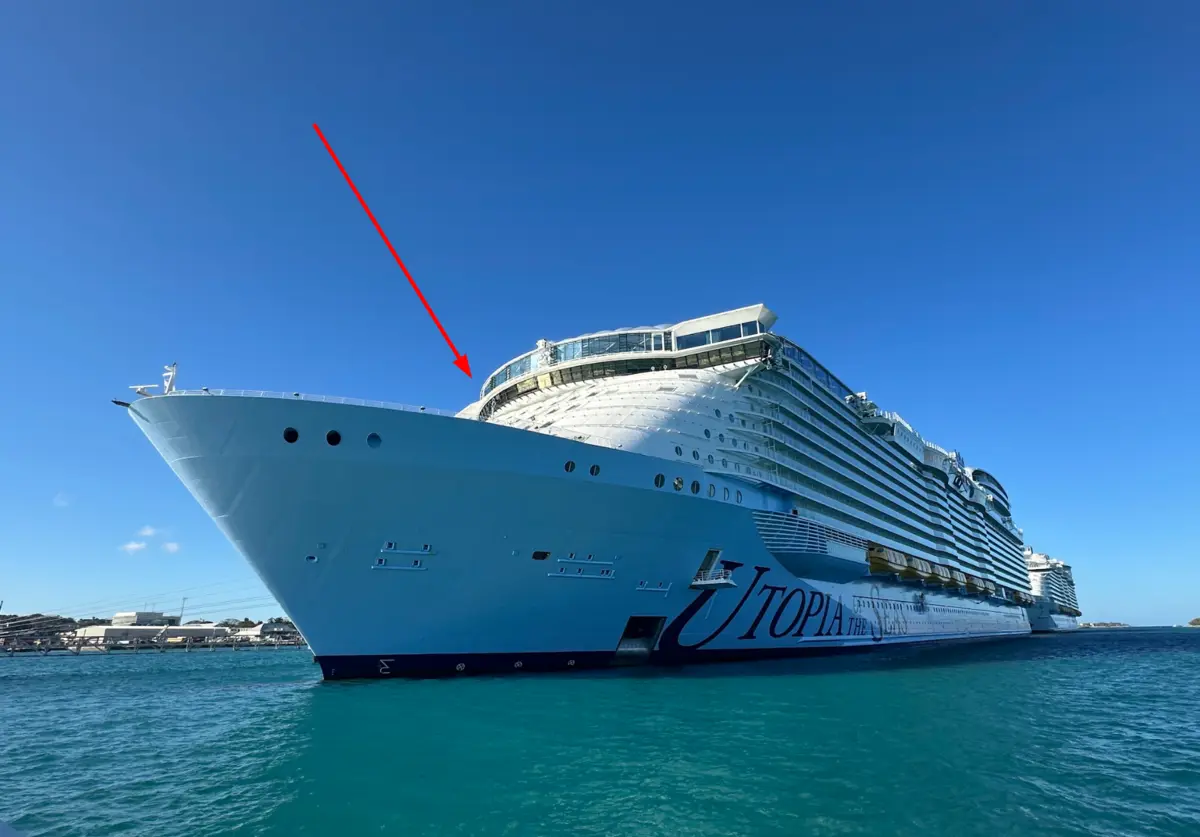
An oceanview stateroom is one category above an inside stateroom with no windows, but it's one category below staterooms with a balcony, and two below a suite.
Oceanview rooms are usually a bit larger than inside rooms and have a view.
If the price difference is negligible, moving up to an oceanview instead of an inside room can be a pleasant upgrade.
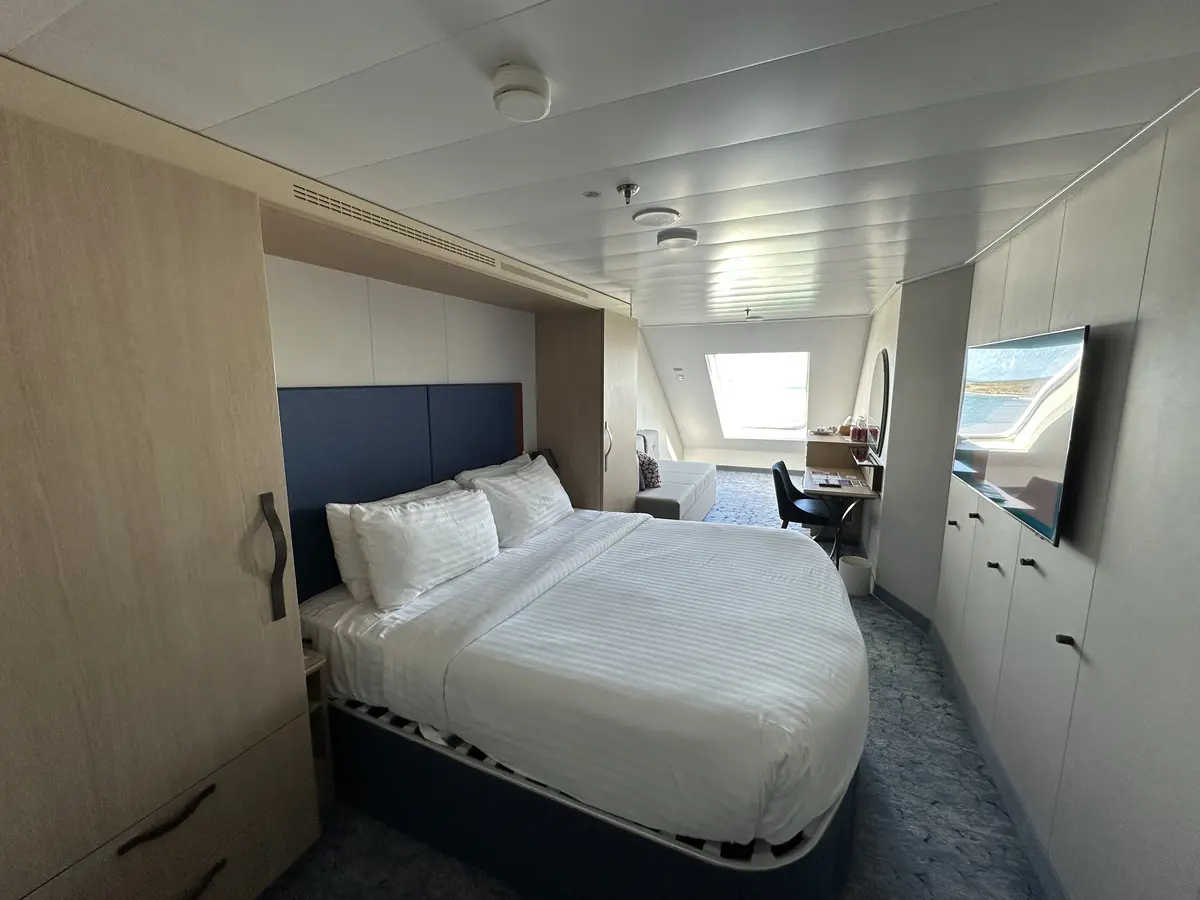
The unusual layout of the cabin at the very front of the ship gave it more space than you'd get in an oceanview cabin on the side of the ship.
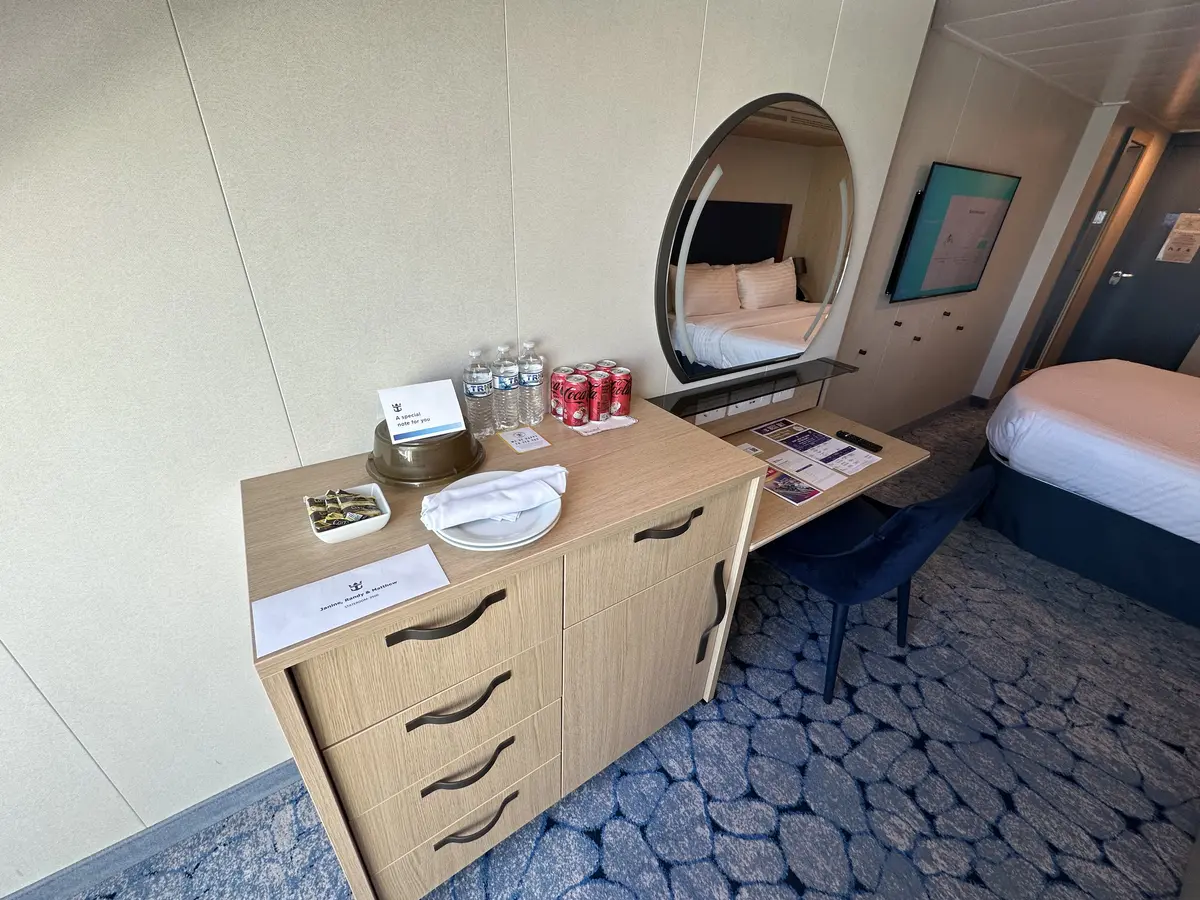
One thing I instantly notice anytime I go on a newer Royal Caribbean ship is how many more outlets are in the room.
As someone that works remotely from cruise ships, it's nice having a desk. I use it as my mobile office location, as well as to store any important paperwork or flyers I'll need later.
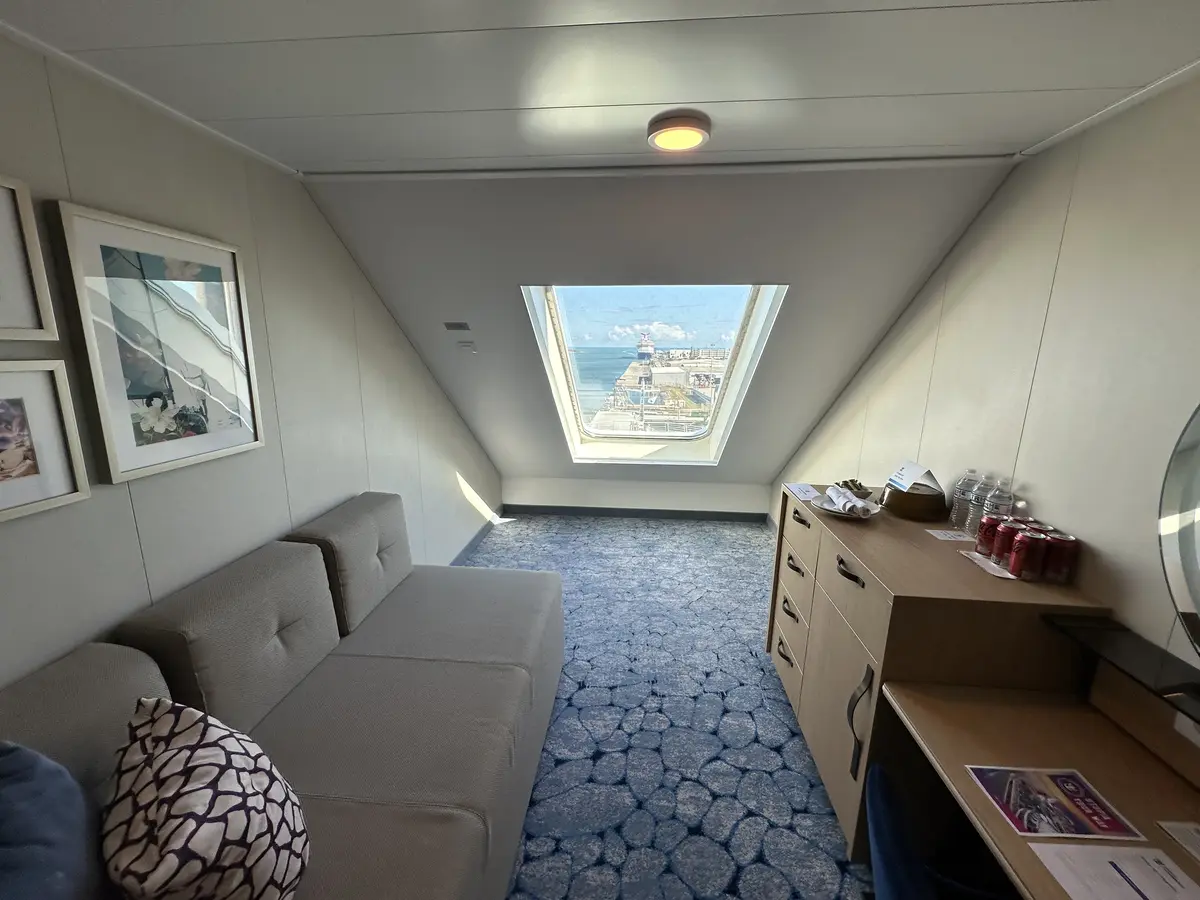
The amount of drawers and storage space is impressive, especially for a ship only offering short cruises.
Suffice to say, there was more than enough space for my belongings.
Plus, there's a fridge to keep food or drinks chilled. It's not a true refrigerator, but perfect for my bottled water.
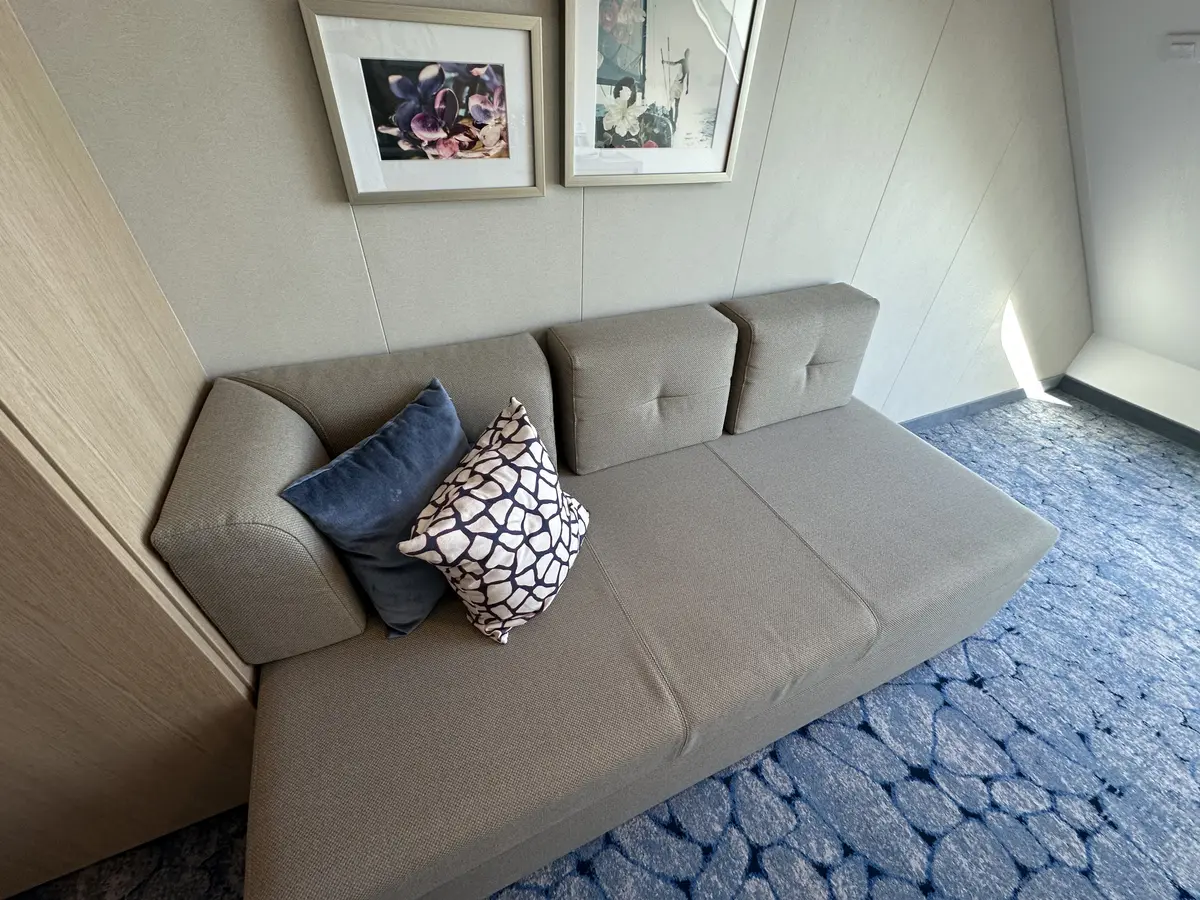
This stateroom is big enough to fit a full sized couch, with a closet next to it.
There are hangers provided in the closet, so it makes it simple to get what you need hung up.

In this room is a private bathroom, that has sink, toilet, and shower.
There is complimentary 2-in-1 body wash and shampoo, but I'd recommend bringing your own hair products from home if proper hair care is important to you. For kids, it's good enough.
There is a pull-out clothing line in the shower that you can use to dry bathing suits or any garments you need to launder yourself.
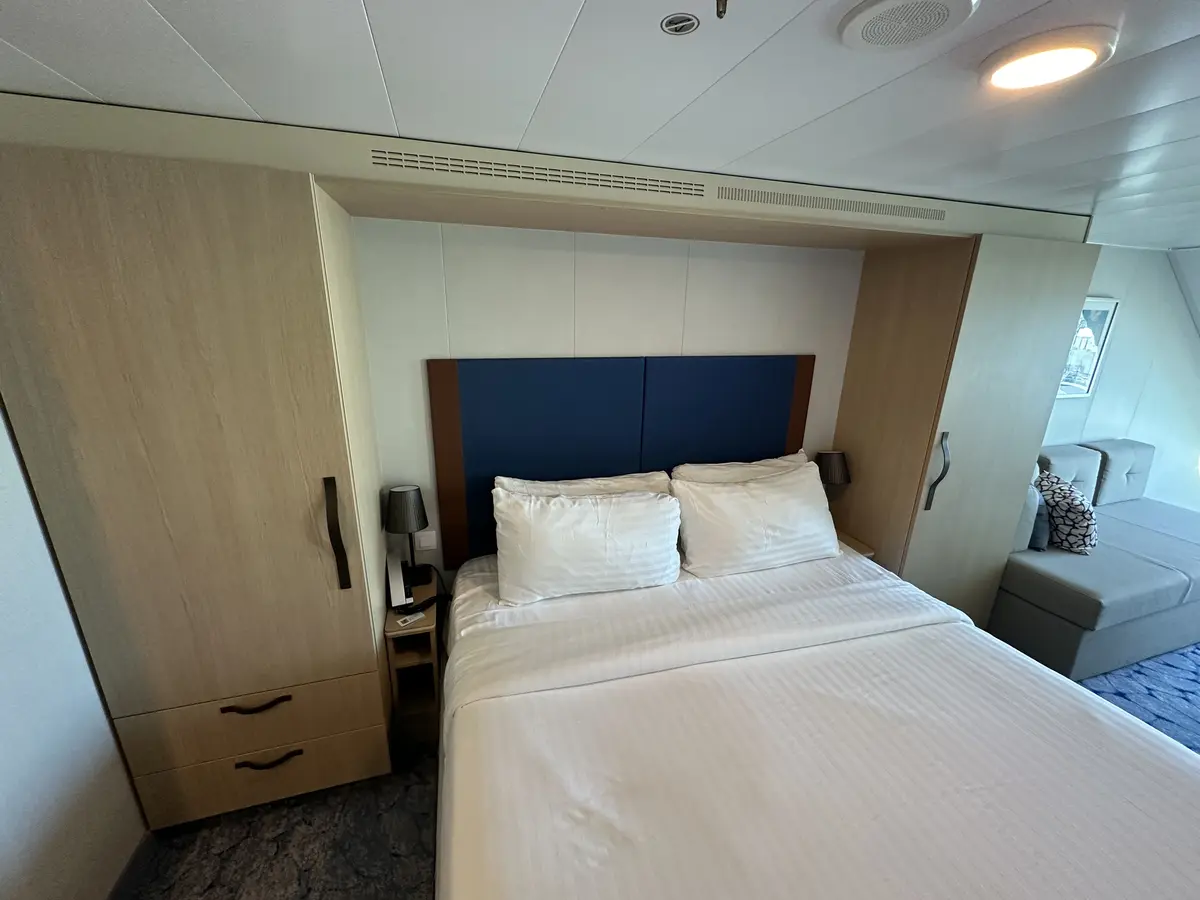
Nearly every Royal Caribbean bed can be split in two, which is perfect for anyone sharing the room.
The stateroom attendant can split or combine the beds at anytime, so don't fret if it's not in the right configuration when you get inside.
There are also two nightstands on either side of the bed with a lamp, charging ports, and a room phone on one side.
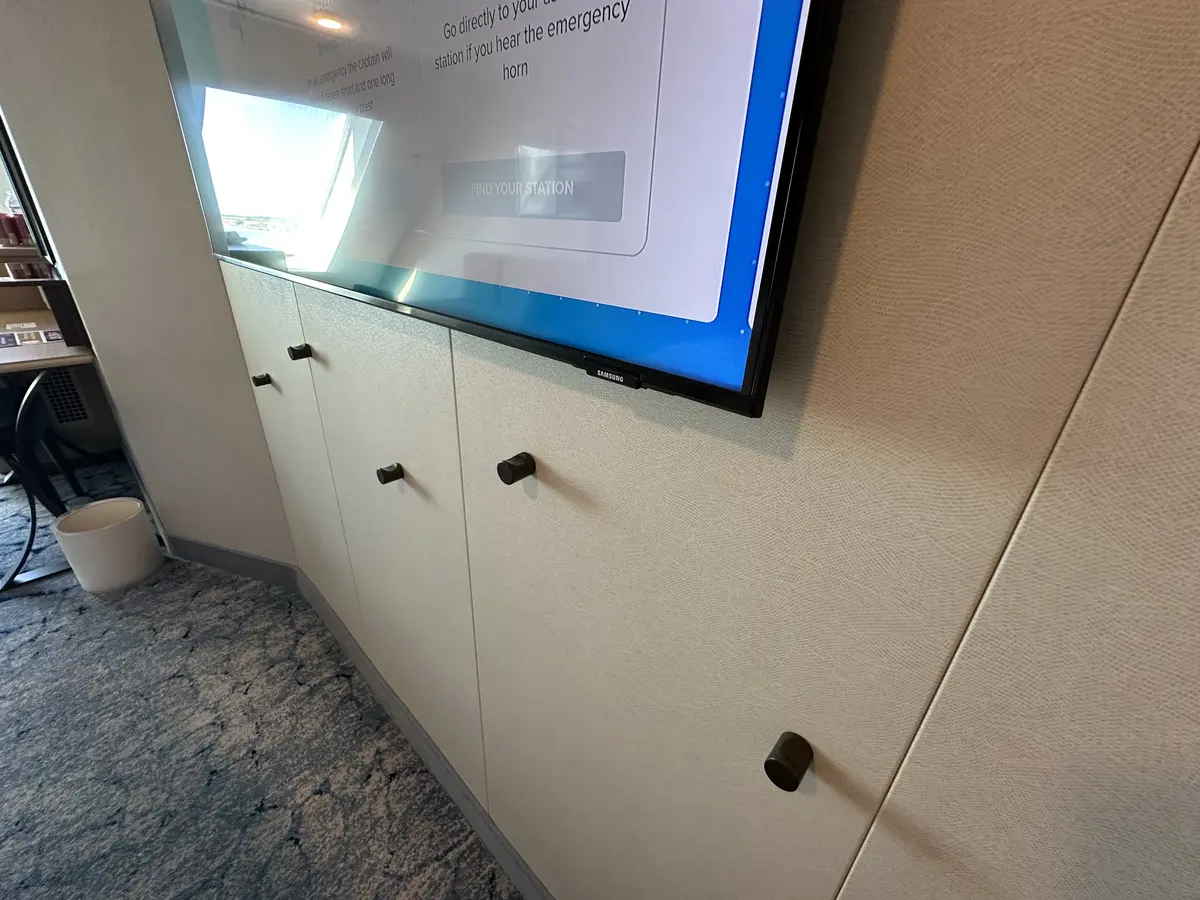
I thought it was smart that Royal Caribbean placed storage hooks in every cabin so you can get certain belongings off the floor.
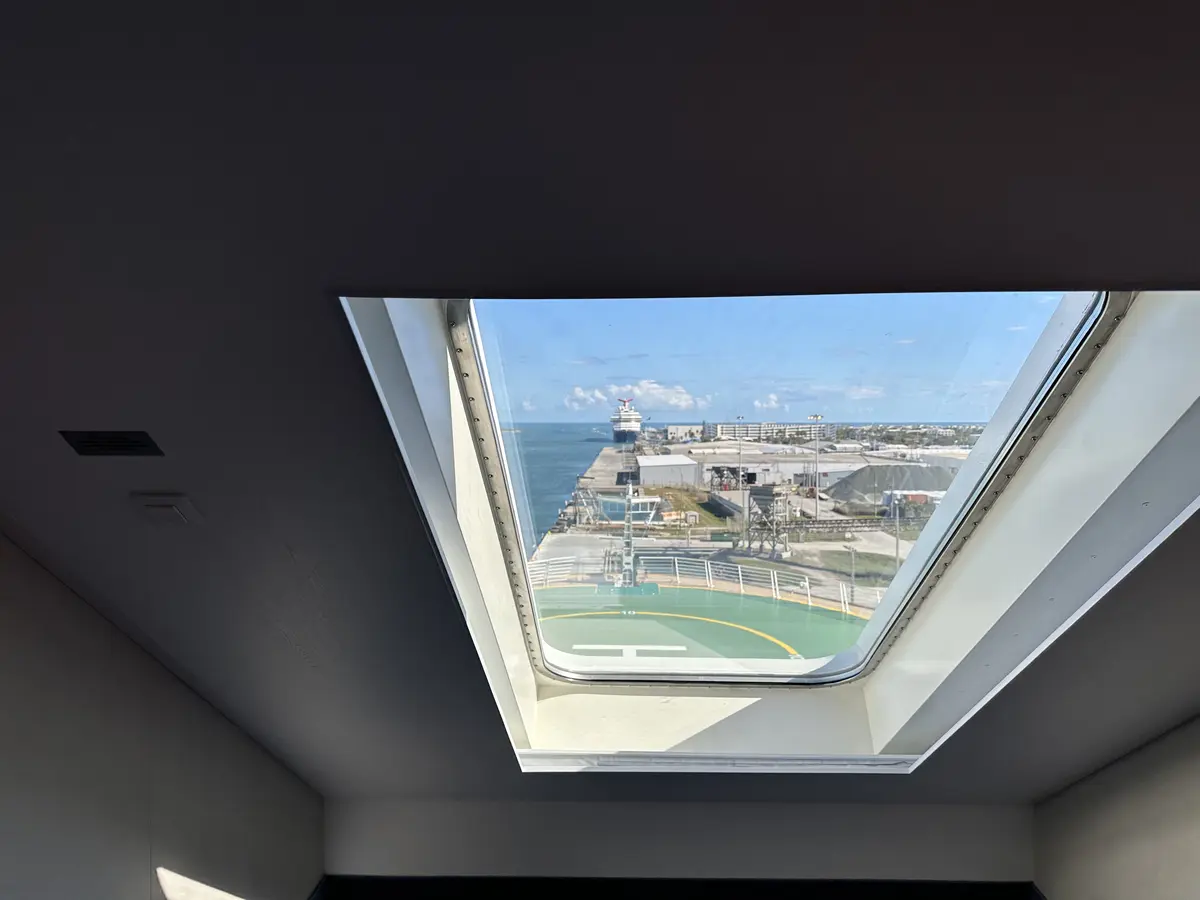
The large window has an electric shade that you can open or close by pushing a button.
This ensured the room stayed dark while I slept, and illuminated the cabin when I was ready for it.

From photos, this looks like an amazing room. However, the amount of movement made sleeping a challenge.
Every time the ship docked, it felt like a mini-earthquake and it lasted long enough to wake me up and keep me awake. This is because the room is above the bow thrusters.
I regretted booking this room because I prefer to sleep in while on a cruise. If you're an early riser, this might not be a problem.
Next time, I'll pick a room more centrally located on the ship to avoid the motion problems.
Royal Caribbean's Main Dining Room is a staple of the cruise experience, and within its daily menu are a few must-eats that you might otherwise overlook.

Each night there's a new menu to choose from, but certain items stand out among those that cruise enough to repeat menus.
Sure, you can order the lobster tail, steak, or chicken cordon bleu and be happy with that. After all, they're great dishes. But they can blind you to delectable appetizers, sides, and entrees that deserve way more attention.
In my 20 years of cruising on Royal Caribbean, I've discovered underrated dishes that stand out as a great choice to order because they're something new, exciting, and totally delicious.
But trust me: You'll be glad you tried these items once you give them a chance.

I liked Indian curry before I ever cruised on Royal Caribbean, but the curry offerings on Royal Caribbean are fabulous.
Indian curry has garnered a cult-like following among cruise fans who recognize it's one of the consistently best options on the menu. Plus, there's a rotating curry option every night of the cruise in the Main Dining Room, including a vegetarian and non-vegetarian option.
If you've never tried it, fear not, it's not as spicy as you might think. In fact, I think nearly all of Royal Caribbean's curries are quite mild and lack the authentic heat it probably should have. Nonetheless, it's quite tame and a great option for someone that has never tried curry.
Try the butter chicken or chicken curry when it's on the menu as a great starting idea. No vegetables, just chicken in a great tasting sauce. Add in some rice and I bet you'll love it.

Yes, the traditional French dish that serves snails is actually really good.
In reality, the baked snails are quite small and nearly drowning in garlic and butter. This makes escargot more palatable to someone trying it and if you eat it with bread, I doubt you'll taste anything other than the garlic and butter.
It's salty, savory, and lots of cruisers swear by it as a must-order item because it's different. Few of us are fine diners at home, so the chance to try something different here and venture out is fun.

According to the Royal Caribbean Dining group on Facebook, the crab cakes are underrated.
"I order this for dinner instead of appetizer," one person posted.

Available on the Welcome Aboard menu (night one), it's one of those dishes I'll see highlighted over and over again by cruisers.
Outside of those from Maryland who have higher standards for the dish, I think it's routinely one of the better options to try.

I don't know how much French onion soup can be hidden, but I'm putting it on the list because if you've ever thought "been there, done that", you haven't.
There's something about Royal Caribbean's French onion soup that truly stands out from the same soup I've had at plenty of other restaurants on land.
The salty broth, cheese, bread, and plenty of onions all combine to never disappoint.

I also appreciate it comes out as nearly scalding hot, which makes a difference with any soup. I think soup should always be too hot to enjoy initially. Plus, it lets the cheese and bread soak in more.
French onion soup has been on the Main Dining Room menu for as long as I've been cruising, and it's probably the top reason I'll choose to eat there instead of another venue.

Did you know the Main Dining Room is open every morning for breakfast too?
It's a traditional American breakfast, but many people swear by the eggs benedict as a must-order. It's overlooked because a lot of people opt for scrambled eggs or an omelet.
Eggs benedict is a poached egg with Canadian bacon along with hollandaise sauce.
Many fans love this dish.
Royal Caribbean has changed another entertainment venue into a casino on one of its ships.

While undergoing routine maintenance work in drydock, Radiance of the Seas returned to service this week with one notable change: a new non-smoking casino.
Reports from passengers onboard the ship indicated the Pub had been replaced with a non-smoking casino. Jeremy Thomasson posted, "Onboard now and can confirm Radiance has removed the Pub and replaced it with a Non Smoking Casino."
A video tour of the new casino was shared by Sea Days & Sunsets and the entire Quill & Compass Pub has been swapped out for a casino space.

The change is part of a greater trend on Royal Caribbean ships to offer more casino space while also offering an enclave for non-smokers.
Traditionally, cruise ship casinos offer a non-smoking and smoking side. But just like airplanes, sharing an enclosed space with smokers doesn't keep the smoke odor on one side.
The new casino space is still attached to the main casino on two ends, but there's a corridor in-between to provide some separation.

The non-smoking casino space has a dedicated bar, which takes the place of the former bar within the pub.
There are slot machines and some table games. In the video tour, it appeared the casino space was still being set up.
Gone is the pub, which leaves one less bar with entertainment onboard the ship.

Radiance of the Seas is one of the smallest Royal Caribbean cruise ships in the fleet, with a capacity of just 2,143 passengers. Compare that to Icon of the Seas, which can handle 5,610 passengers at double occupancy.
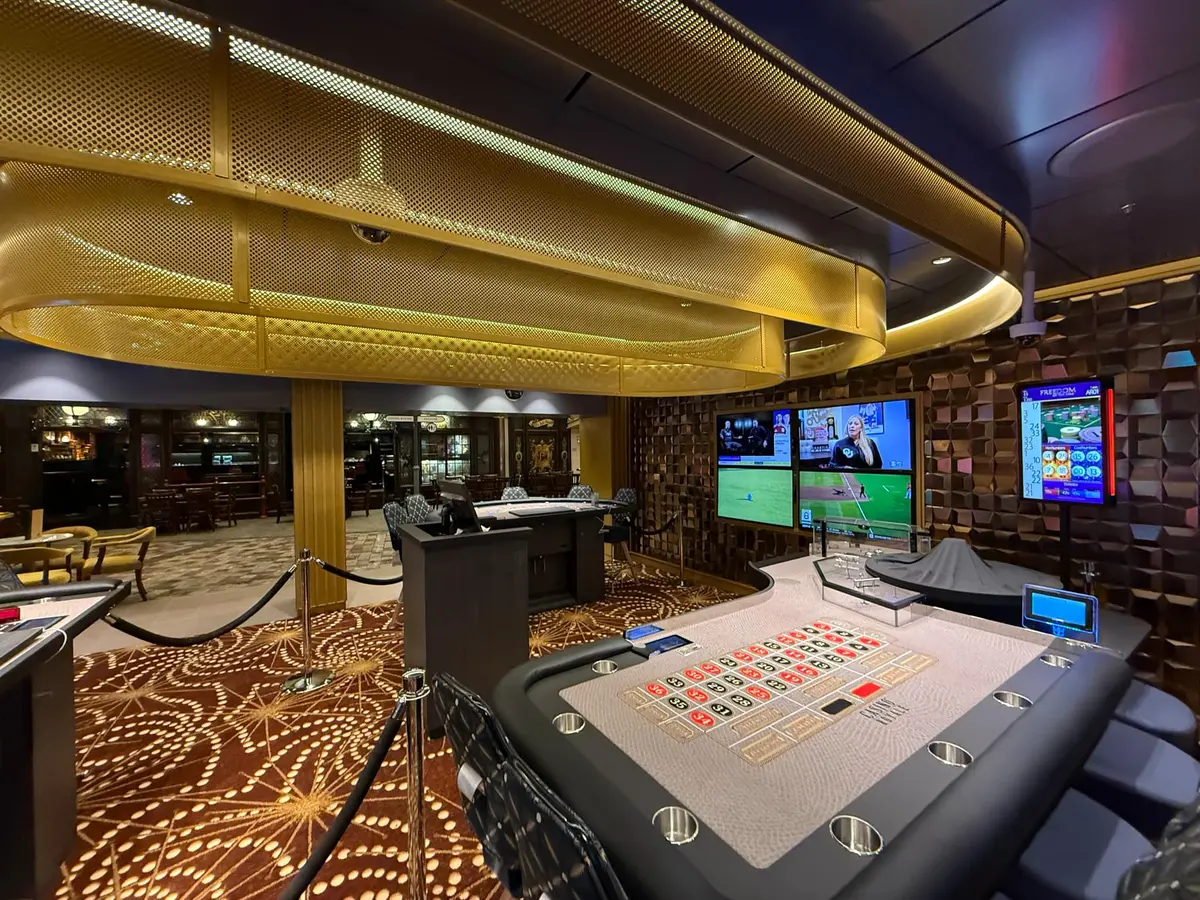
Royal Caribbean has been on quest as of late to expand its casino offerings on its ships, a trend that began with the launch of Wonder of the Seas.
Wonder of the Seas launched in 2022, and was originally slated to debut in China. Instead of a jazz club on deck 4 that all other Oasis Class ships had previously had, there were plans for a casino instead.
When Wonder of the Seas was shifted and debuted in North America instead, Royal Caribbean decided to experiment with keeping the casino. Evidently it was a success, because more ships received the update.
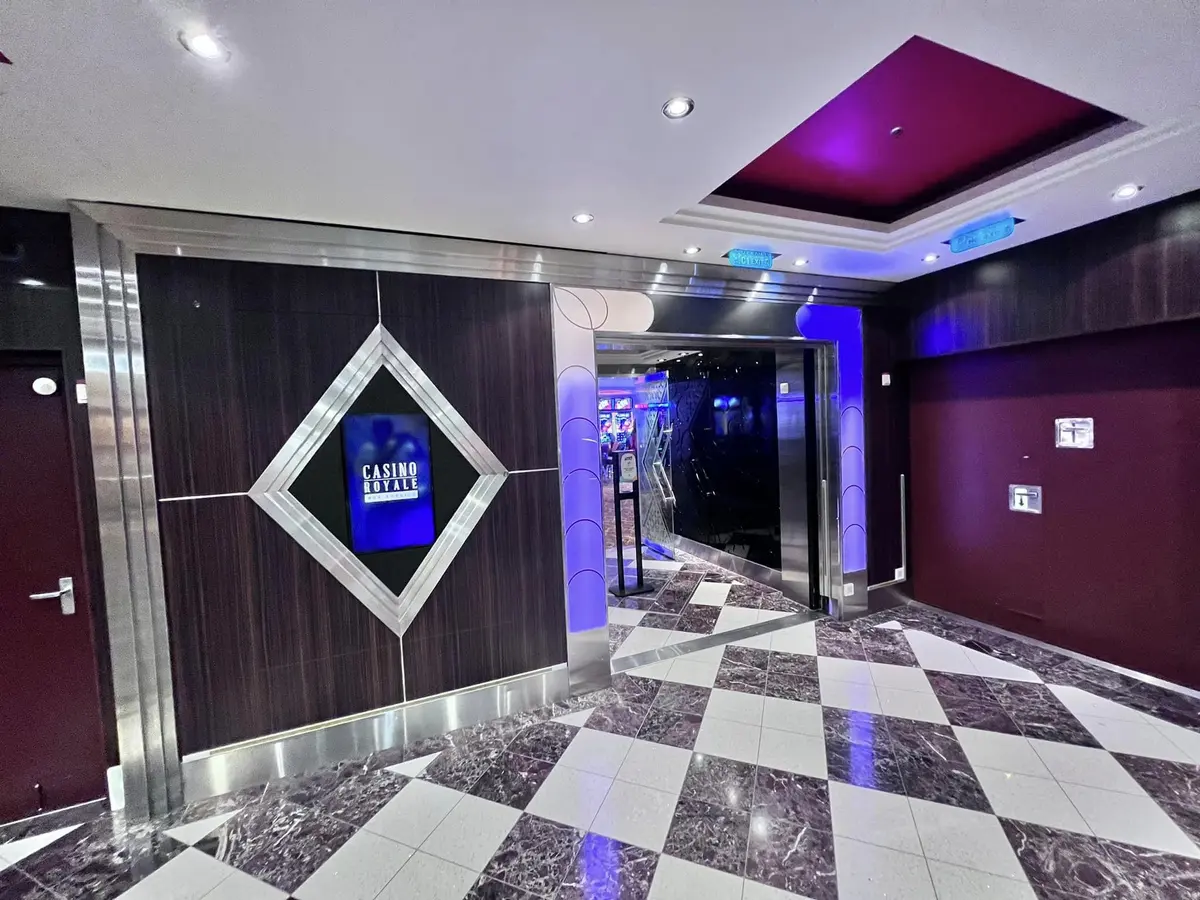
Since then, all the Jazz on 4 venues on other Oasis Class venues have been replaced by non-smoking casinos.
On some ships, the cruise line has even moved the Crown Lounge loyalty space to offer an even bigger casino fingerprint.
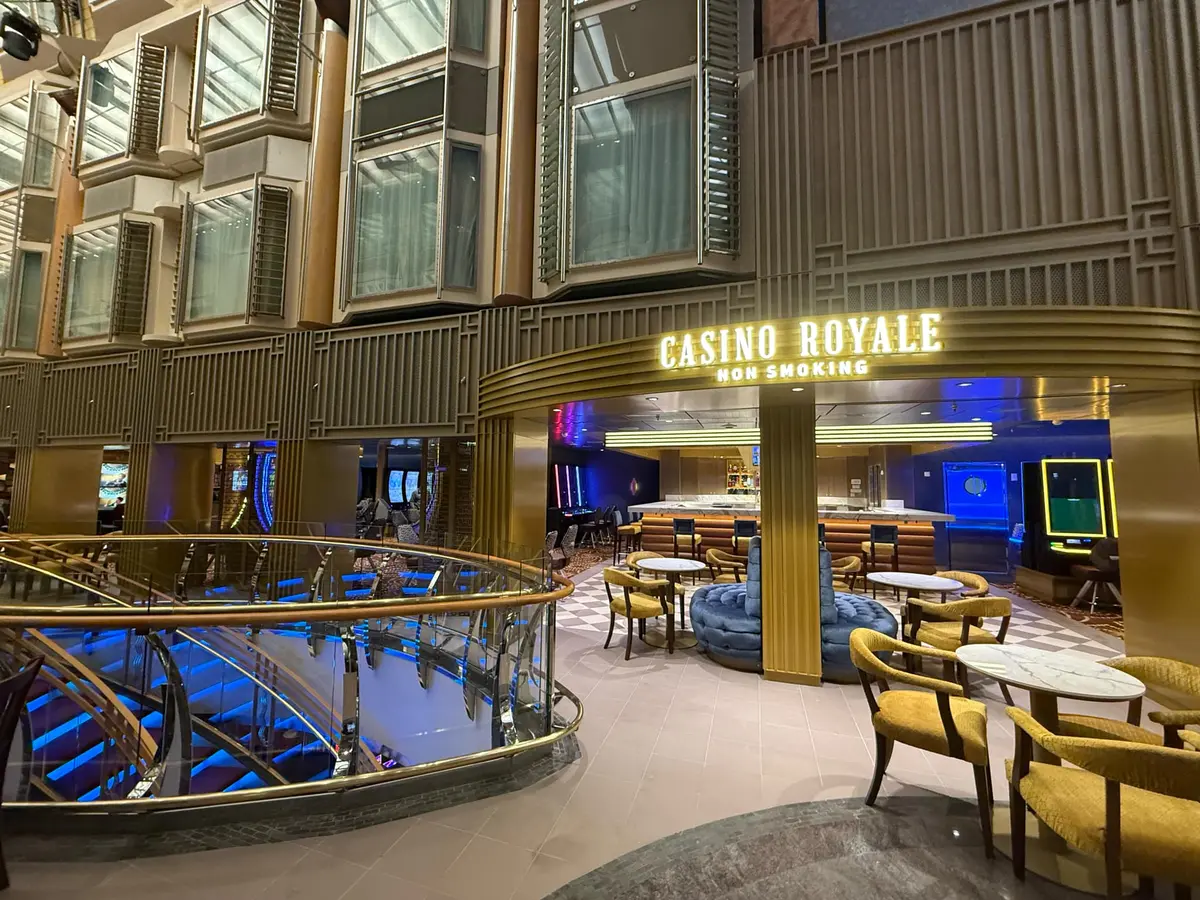
On Freedom of the Seas, the Vintages wine bar was removed and replaced with a non-smoking casino.
In this case, this added a casino on the Royal Promenade for the first time.

When Legend of the Seas debuts later this year, it will be the first ship in the fleet to have a two-story casino.
In fact, Legend will have the biggest casino space of any ship.

Adding more casinos has two benefits, but it comes at a price.
First and foremost, adding more gambling space provides more revenue opportunities for the cruise line.
Royal Caribbean Group does not break down its revenue it earns from gambling, but it's hard to imagine that based on how many more casinos are being added to ships that the move is not a profit generating space.
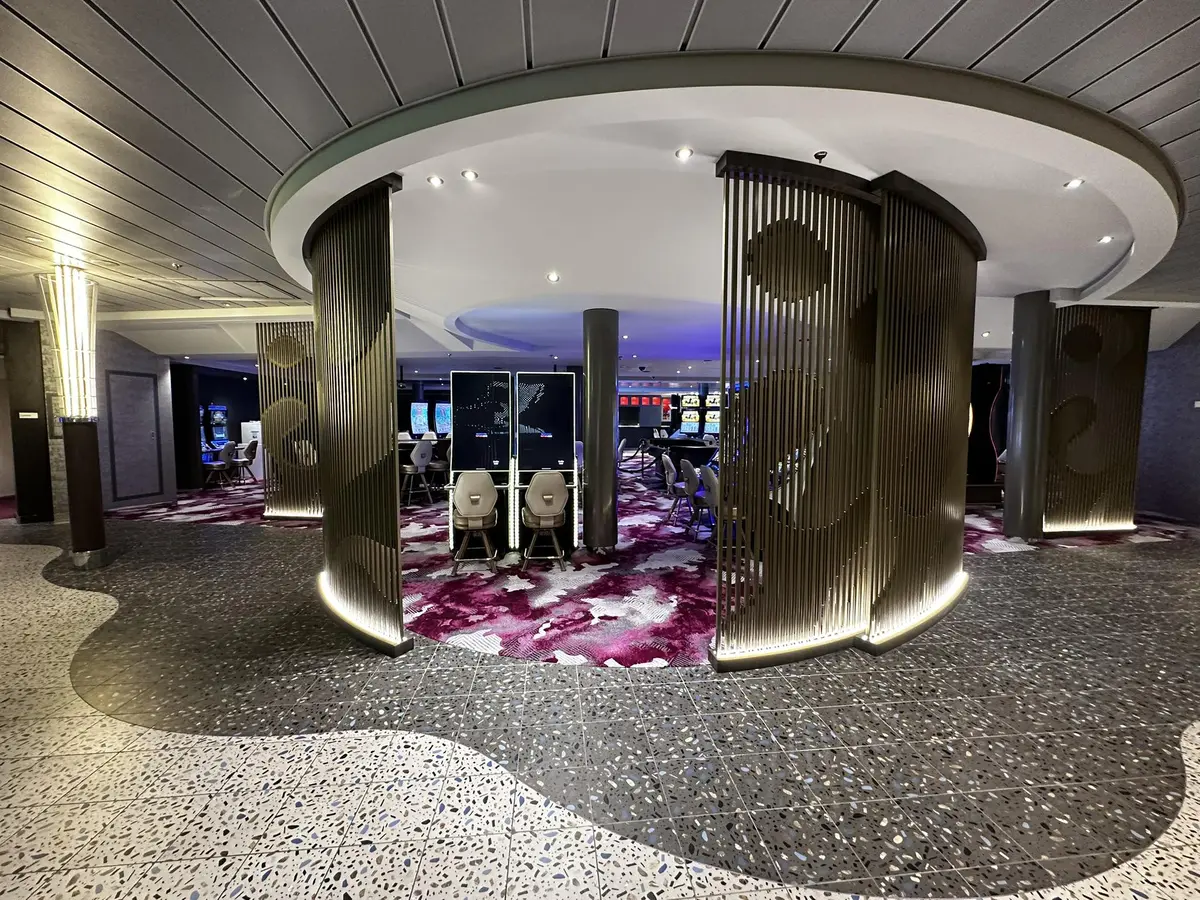
Traditionally, casinos have always been a profit generator for cruise lines.
Anecdotally, the casino loyalty program seems to be more popular than ever, and those that gamble enough to get free cruise offers are reporting an influx of additional offers.
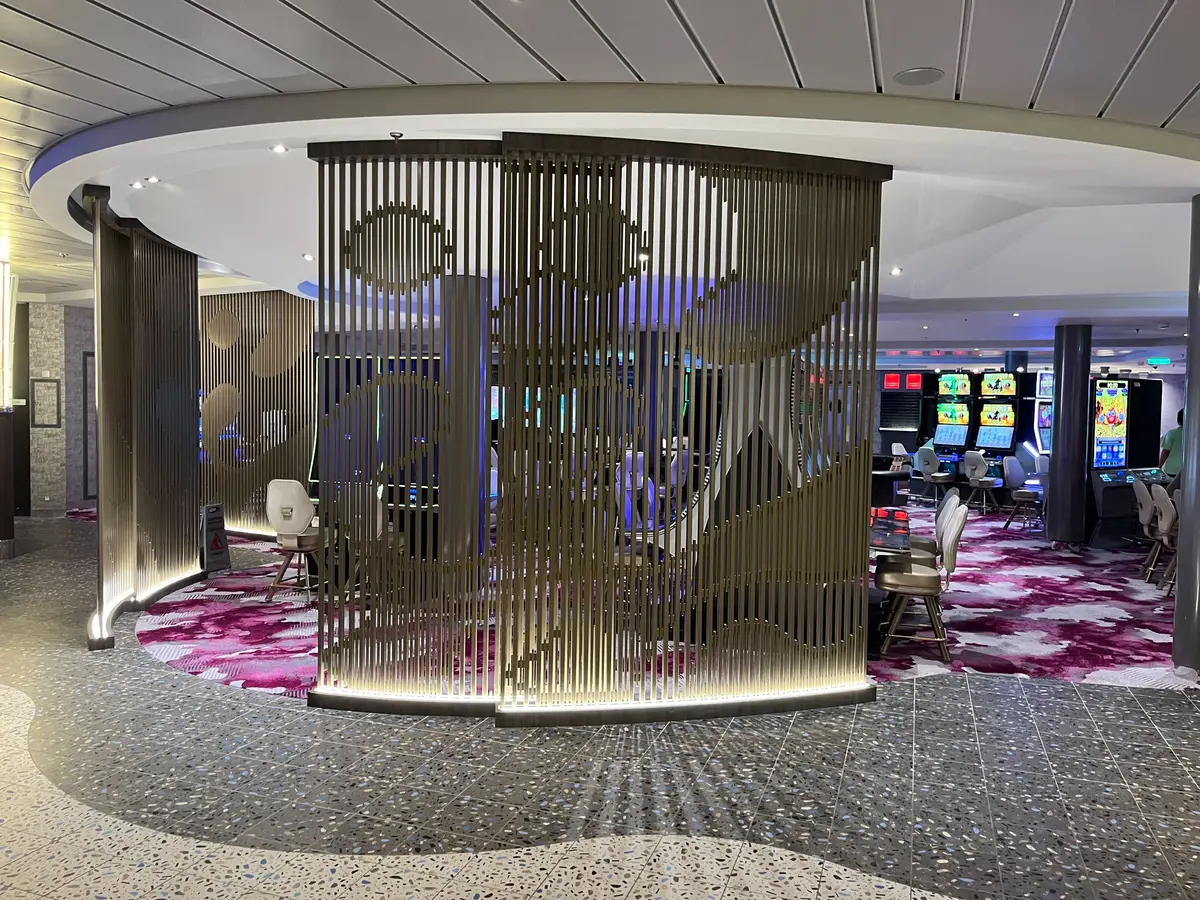
For passengers, it's a case of good and bad news with the casino expansion.
Those that don't smoke and refuse to gamble in the regular casino because of the smoke odor have celebrated the expansion of casino spaces.
It offers them an opportunity to enjoy gambling without the second hand smoke issues or even smell. Plus, a bigger casino means more capacity and possibly less crowds.

The downside is these new casinos replace bars and lounges that sometimes offered entertainment.
In the case of Radiance of the Seas, this change possibly means there is no longer a pub singer entertainer onboard. It remains to be seen if the pub singer will be moved to another venue.
With Jazz on 4, the jazz music was moved to Central Park on the Oasis Class ships to perform outdoors.

Similarly, when Royal Caribbean got rid of the comedy club space to make room for a casino, the comedy shows got moved to the Royal Theater.
Comedy in a large theater is adequate, but lacks the crowd work and sense of inclusion you get in a smaller comedy venue.
If you've ever been on a cruise ship and noticed there are moments that stick out for slowing everything down, you're certainly not alone.

While nearly all the experience being on a Royal Caribbean ship is fantastic, every cruise will have moments when you find it difficult to avoid a delay, regret, or general hassle.
I was on Royal Caribbean's Utopia of the Seas getting back on the ship after our day in Nassau when I ran into a very crowded elevator bank. Getting back on a ship can be one of those moments, but there are ways to circumvent the problem to a degree.
It got me thinking about other less-than-desirable situations on a cruise you might encounter and the tricks you need to know to beat them.

When you get to the cruise terminal, there's bound to be a line of people waiting to go through security and check-in for your cruise.
There's actually a shorter line you can get into simply by knowing how to complete the online check-in beforehand.
Express Boarding is available to anyone, but you need to know what to do and how to do it.
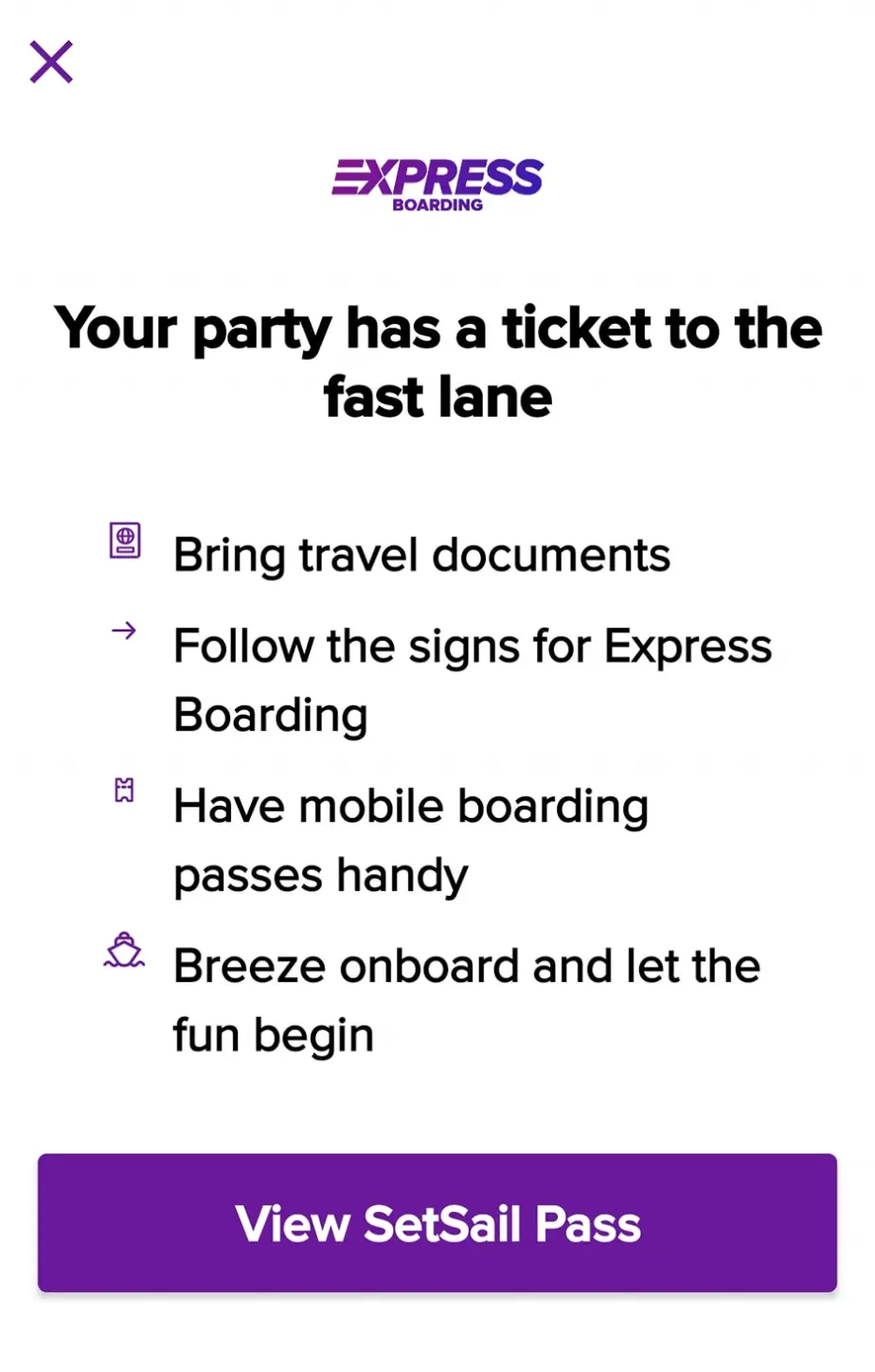
This special line is shorter and will get you onboard faster because you would have already completed all the important steps.
There's no cost to get Express Boarding, but you need to complete all of the online check-in steps within the Royal Caribbean app, including the selfie and health questionnaire.
This is one of my favorite cruise hacks and worth doing every time to make check-in a breeze.
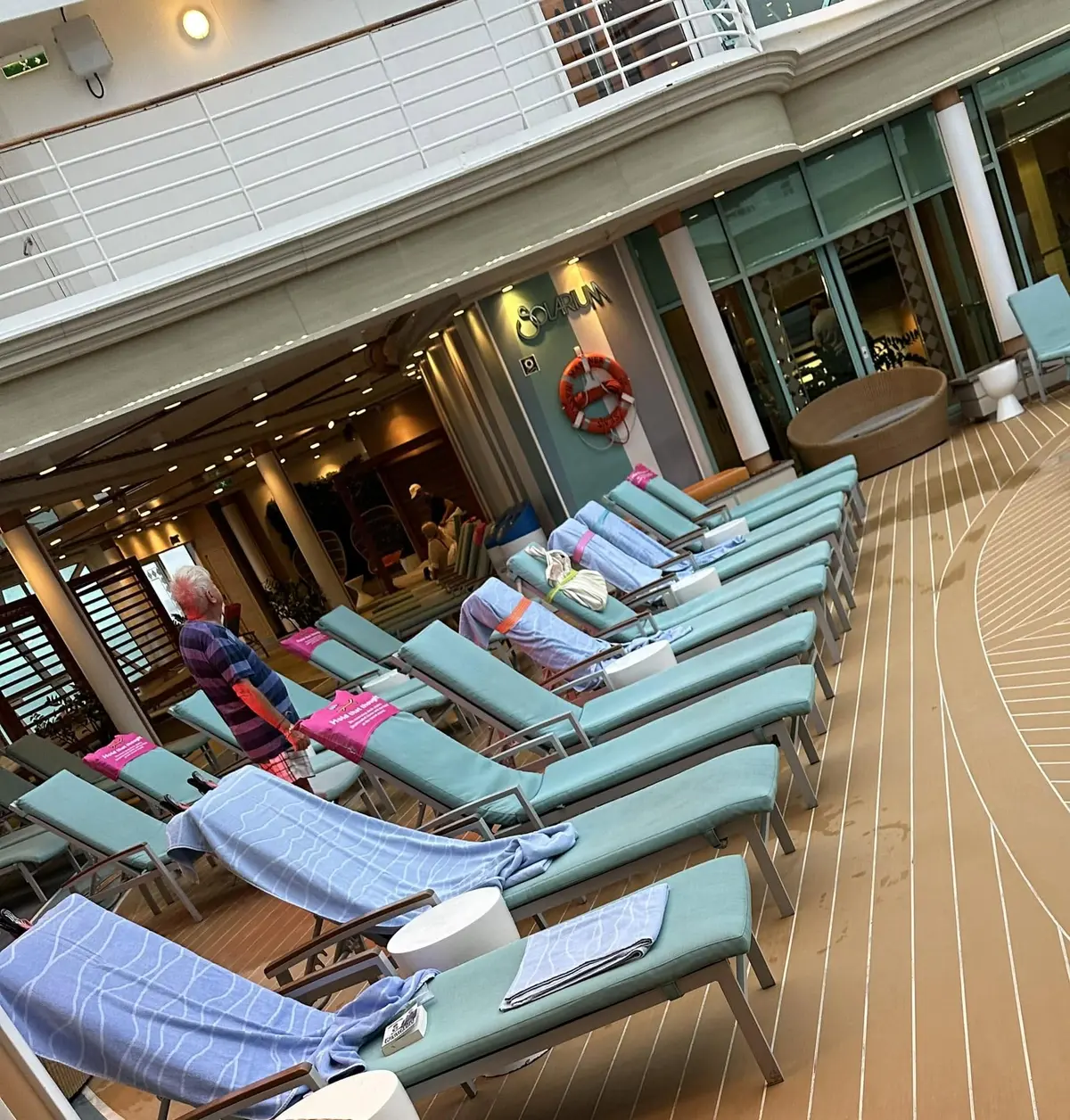
Whether you're at a Marriott resort or Royal Caribbean cruise, chair hogs are a thing.
Some people get up early, reserve a bunch of lounge chairs by the pool, and then never relinquish them. Many times the chairs they reserve don't even get used for a few more hours after.
Royal Caribbean claims they have a policy to combat this practice, but I've rarely seen it enforced.
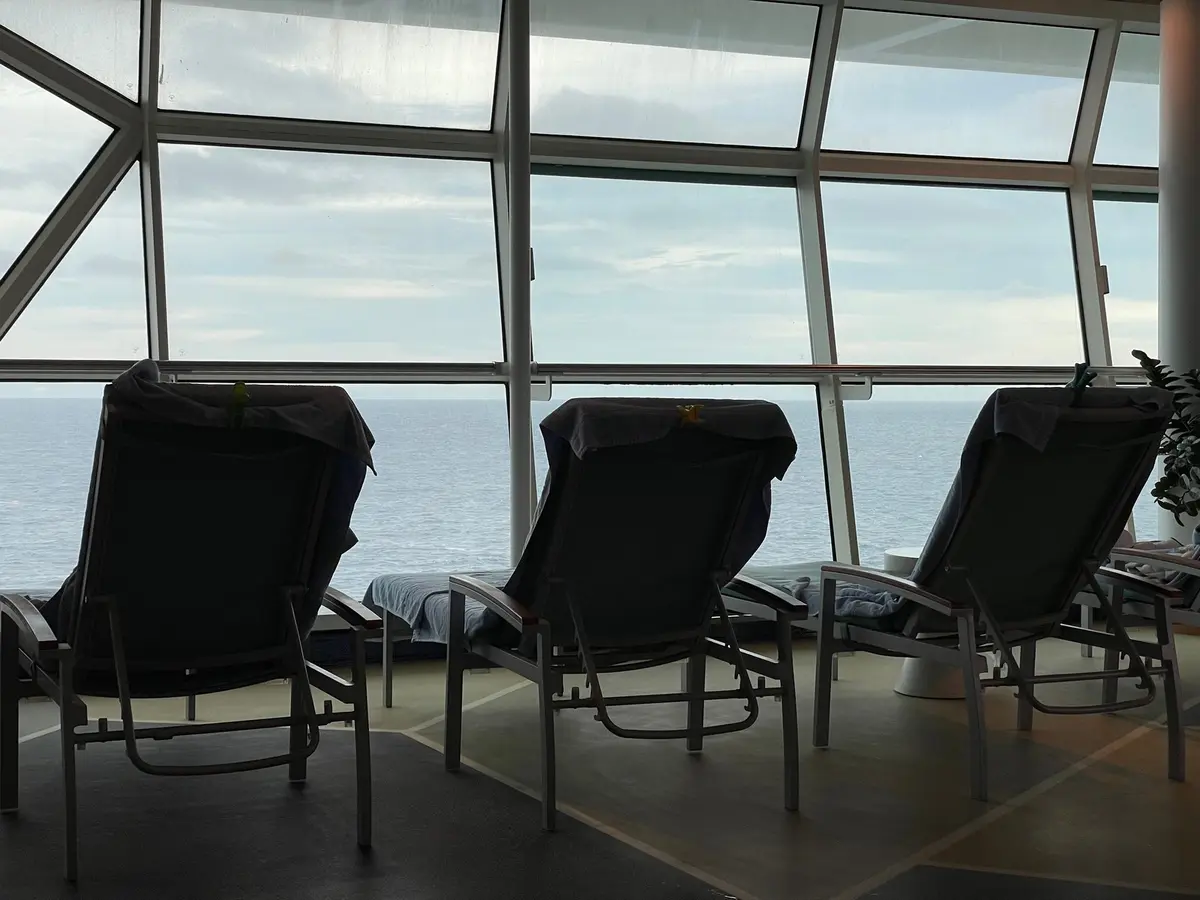
There are a couple workarounds (and no, I don't advocate moving their stuff. I don't want a confrontation on my vacation).
First, if you can get up to the pool deck before 10am, there's a good chance you'll have no problem getting a lounger yourself.
In my experience, it's the people that sleep in and roll up to the pool deck later in the morning or early afternoon that run into problems.
Another idea is to go to the pool on a port day, when there's far less demand for the pool.
Staying onboard a ship on a port day is a frequent cruiser trick, and it feels like you have the entire pool to yourself.

I mentioned the issue earlier in this article about a crowded elevator, and you'll likely encounter crowded elevators multiple times during your cruise.
Elevators can get easily overwhelmed when a show lets out, dinner wraps up, or the aforementioned post-excursion rush.
The stairs are still the best alternative to crowded elevators. While taking the stairs may not be ideal, I find it can be faster in many cases than even waiting for an uncrowded elevator (especially if it's less than 4 decks).

I'd recommend taking the stairs if you're going under 3 decks.
For my excursion problem, you could take the stairs just a couple decks up and then wait for the elevator there. You'd be surprised how many people will get off the elevator at that point, freeing up space.
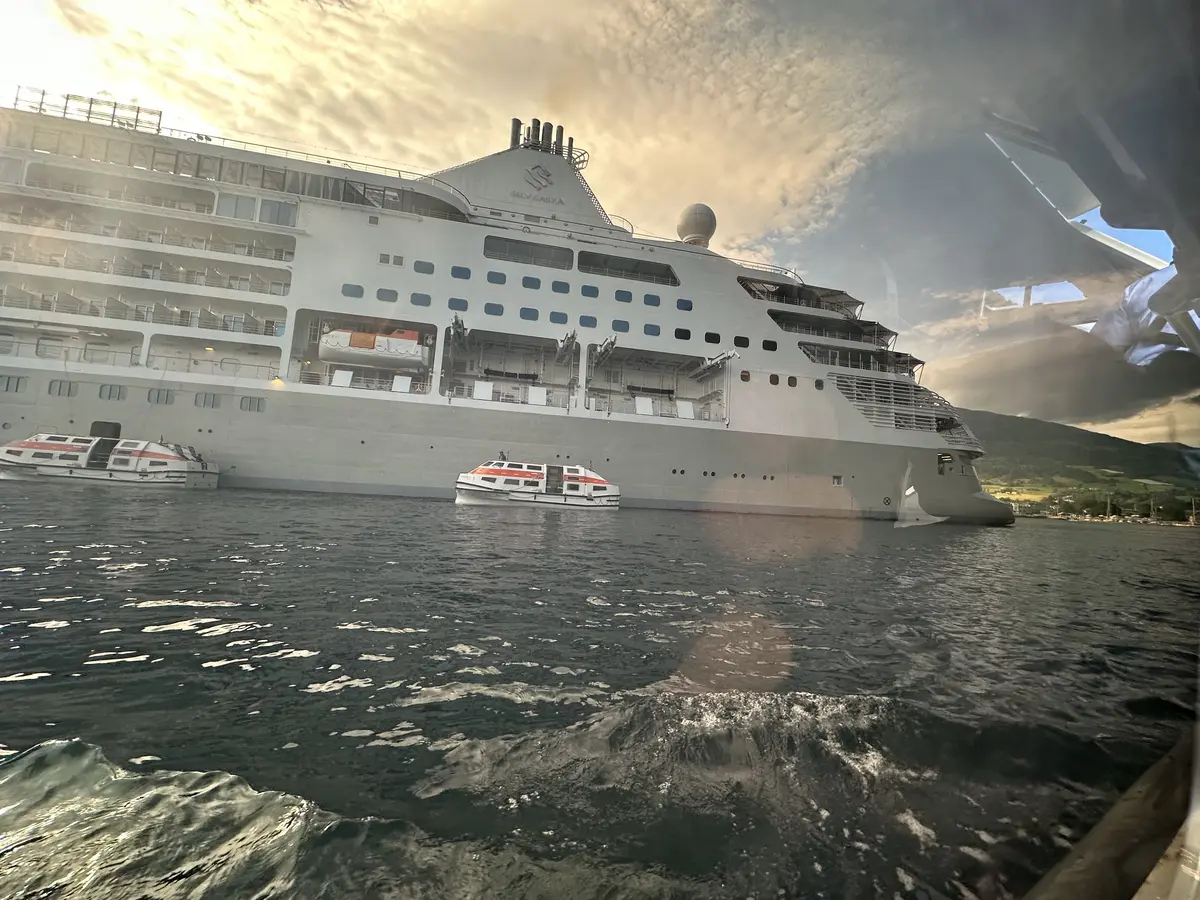
It seems to be getting rarer to have a cruise with a tender port stop, but if you do, waiting for a tender boat in the morning can feel really frustrating.
Tender boats are slow loading and unloading, and they have a small capacity. With seemingly everyone trying to head ashore at the same time, it can lead to very long lines.
I find the best strategy if you have a tender port is to book a Royal Caribbean excursion to at least get you there.
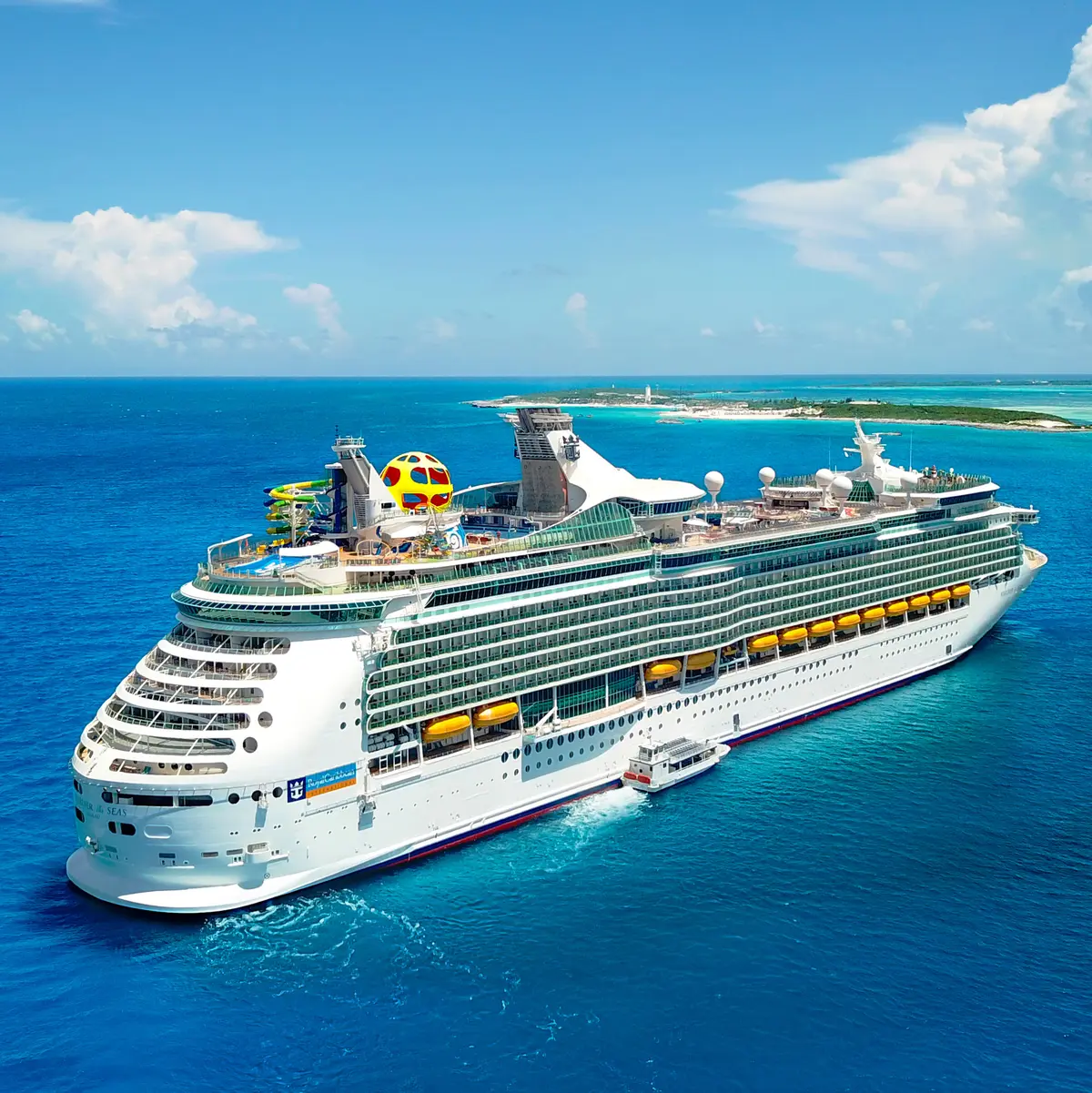
Royal Caribbean excursions always get priority tendering. This means you'll meet for your tour on the ship and then be escorted to a waiting tender boat just for those on a tour.
Say what you will about the advantages of a third party excursion, but I think in a tender port booking a cruise line excursion is a must-do to avoid the hassle and tender boat lines.
Did you know most Royal Caribbean ships have water slides onboard? In fact, the Icon Class ships even have an entire water park!
A lot of people know about it, and that's why lines for the water slides can be among the longest waits you'll encounter on any Royal Caribbean ship.
Instead of taking your kids on a sea day and waiting in line, I have a few workarounds.

First, bring your bathing suits on embarkation day and hit the water slides as soon as you get onboard.
There's usually no line on the first day of the cruise because no one has their bathing suits with them (they're packed in their luggage). Change into your bathing suit at a public restroom and you'll practically have them to yourselves.
The second strategy is to come back early from a port day.
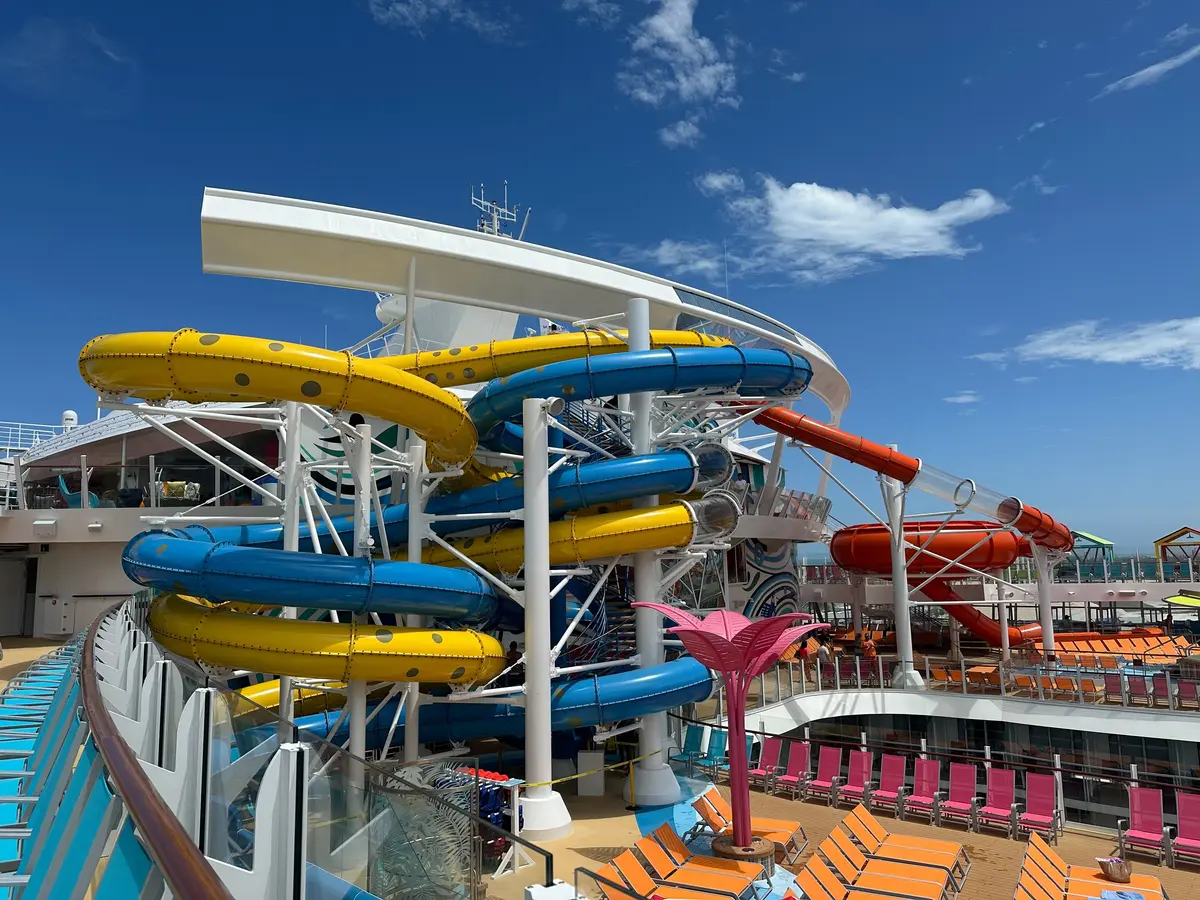
Get off the ship early and enjoy some time at the beach or on whatever tour you're doing. But if you can get on the ship a few hours before all aboard time, I've found the water slide lines to also be quite short.
Lastly, if all else fails, wake up early and hit the water slides then.
Sea days will be the most crowded, but if you can get to the slides around 9am when they open, the lines are usually much shorter for a bit.
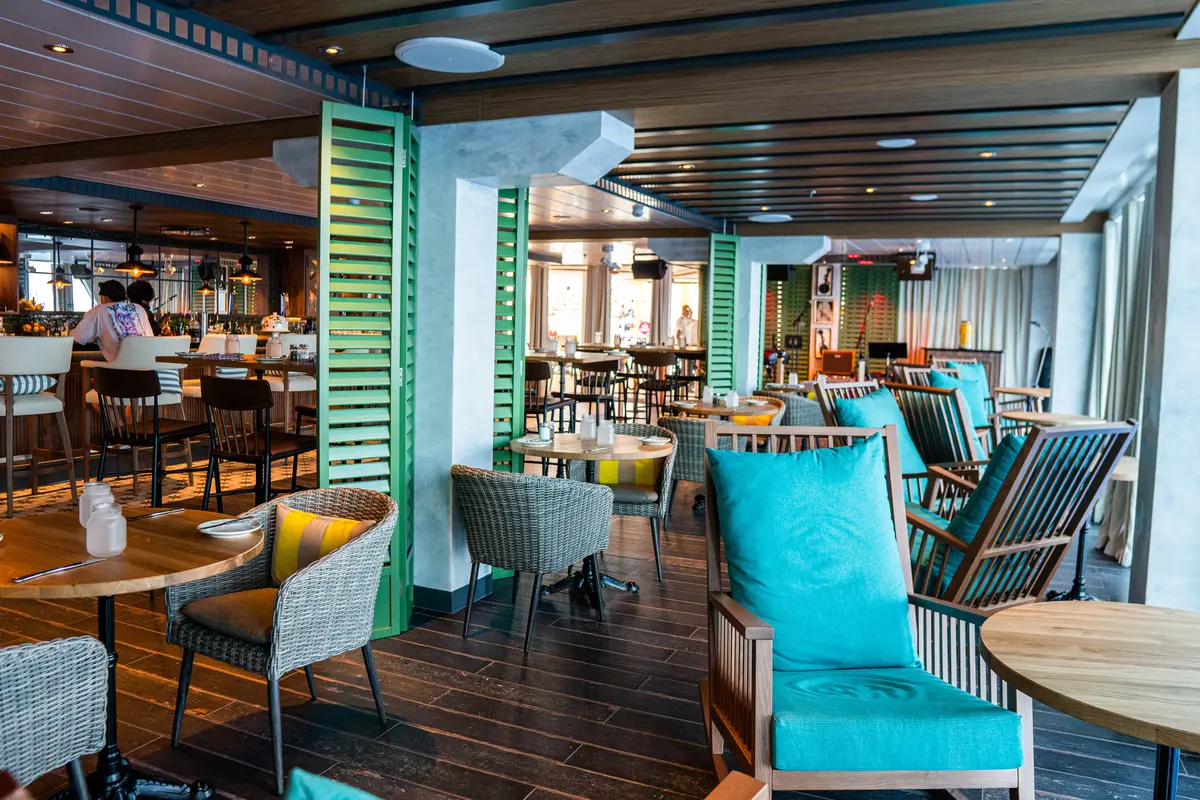
This is a problem I read about online after people get home from their cruise, where they realize too late they missed out on something they would have loved to do on their cruise.
Classic examples include:

There's a lot to see and do on a cruise, so I don't blame someone for overlooking one aspect of a cruise. However, I think avoiding FOMO is worthwhile with a little bit of prep work.
I recommend before going to bed to check the Royal Caribbean app or Cruise Compass to preview what events and activities are coming up tomorrow.
Before the cruise begins, try to pre-book everything possible. Shows, specialty restaurants, private karaoke sessions, and excursions are all things you can reserve and lock-in so there's no excuses later for missing it.

I also think joining a roll call group is a good idea to educate yourself on what's happening. Often times I don't know what I don't know until someone else mentions it and then I want to try it too.
We have our own roll call section on our message boards or you can try a Facebook group.
Speaking of educating yourself, watch a ship tour video. We have a full Royal Caribbean ship tours you can watch that cover every inch of the ship and don't include any sales pitches or my face in the video.
Lastly, don't miss out on the fun theme nights of your sailing.
You can look up the theme nights before your cruise begins and have the perfect matching outfit for everyone.
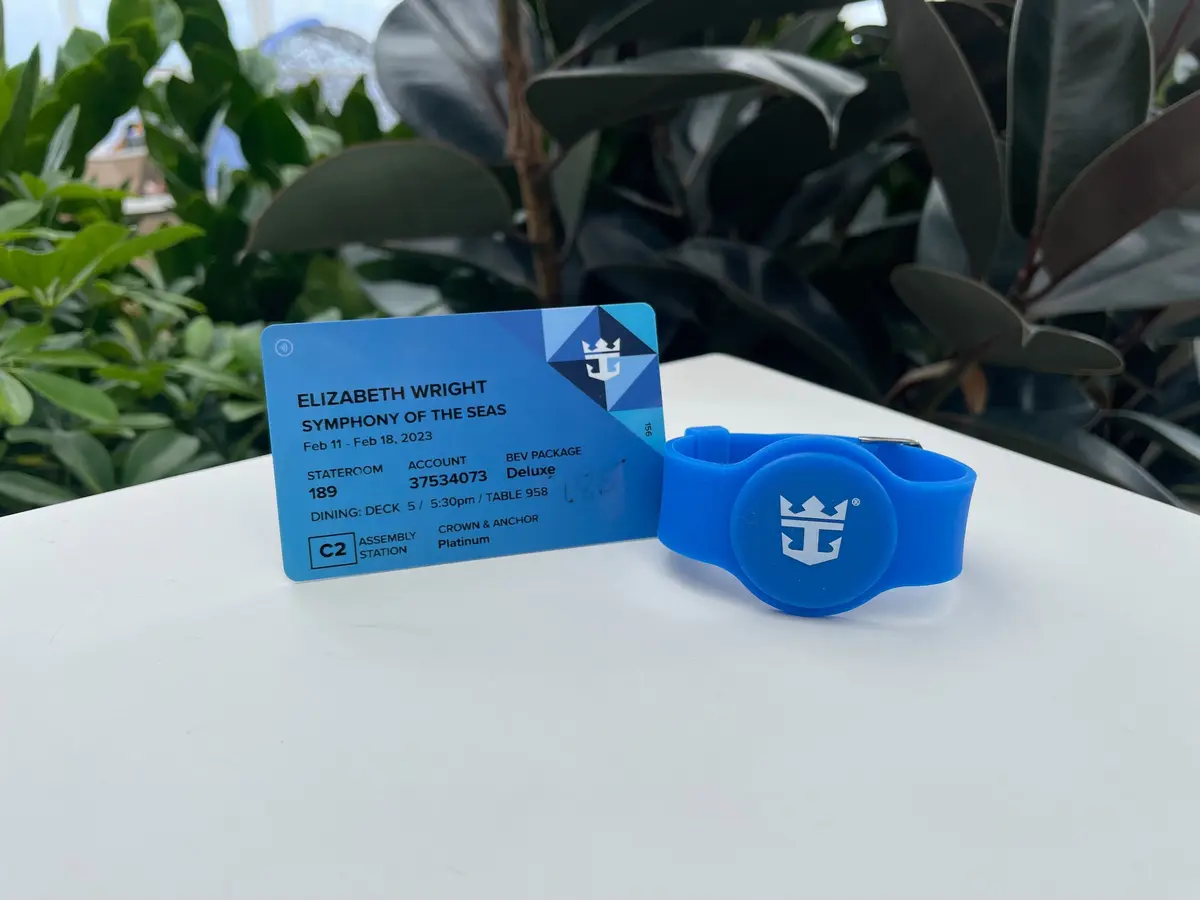
There have been plenty of cruises where I've asked aloud to my family, "who bought this?" as I point to a charge in the Royal Caribbean app.
In most cases, I forgot about something. But sometimes there's an error.
On one cruise, the crew member misconstrued my terrible handwriting and thought I tipped them $80 at a restaurant.

There are a few ways you can limit your onboard charges to avoid confusion later.
Prepaying gratuities is one way to eliminate a lot of onboard charges. Instead of getting a daily charge, I prefer to prepay so it's all take care of before I sail.
It's also a good idea to turn off in-app purchases for kids. You can go to Guest Services on the ship and ask to turn off their charging privileges to ensure they don't accidentally (or intentionally) start buying up arcade games.
And to lessen the surprise factor, I recommend checking your onboard account daily. This is so easy to do with the Royal Caribbean app.
Few people impacted the cruise industry as deeply as Richard Fain had.

With a career spanning decades, he became the leader of Royal Caribbean Group and an instant leader within the travel space. Under his leadership, Royal Caribbean launched the megaship era and revolutionized the cruise industry. But his biggest impact may have come with the cruise industry shutdown and guiding cruising back.
He worked almost 40 years in cruising before stepping aside in recent years.
In his new book, Delivering the Wow he said, "Almost everybody is focused on what's going to happen next month or next year and I think it's the ability to focus on the north star that's key to success."

His words are an important reminder to almost anyone how important it is to be focused on your long term goal, despite the daily grind and distractions that can steer you away.
The advice in his book centers around a focus on how he used long term goals to guide him, in the same way mariners use the North Star to sail a ship at night.
"The north star is millions of miles away," he explained. "We don't expect to reach it. We're using the north star as a goal, a long-term direction. It's the same thing when you're building a business. It's just something we're constantly striving toward."

The advice is something that was important to him and the company as Royal Caribbean came out of the shutdown of 2020 and accumulated billions of dollars of debt and barely any income.
He called the realization that Covid would be a major problem prohibiting his business from functioning as "devastating".
Clearly the company's return to service and tremendous success in a few short years since 2020 has been the result of this business tenant emphasizing not losing sight of getting back to business.

Richard Fain joined Royal Caribbean in 1988 and left a legacy that reshaped the modern cruise industry.
When he stepped into leadership, Royal Caribbean was a relatively small player with only a handful of ships. Over the decades, he helped transform it into one of the dominant forces in global cruising, with a fleet that spans continents and sets industry trends rather than follows them.
Royal Caribbean didn't just grow in size, it broadened its reach. Royal Caribbean expanded its portfolio to include Celebrity Cruises and later Silversea, giving travelers everything from contemporary mega-ships to premium and ultra-luxury experiences under one corporate umbrella. That diversification strengthened the company’s position and widened its appeal to different kinds of cruisers.

His leadership ushered in the megaship era. The debut of the Oasis Class vessels didn’t just build bigger ships, it fundamentally changed expectations of what a cruise vacation could be. Suddenly, a cruise ship wasn’t just transportation and a pool deck. They now have neighborhoods, entertainment venues, specialty dining, and attractions people had never seen at sea before.
He was also a major supporter behind the bold reinvention of Perfect Day at CocoCay. What had once been a fairly typical private island stop became a full-scale destination with water park, cabanas, a massive freshwater pool, and experiences designed to rival shoreside resorts.

It was another move that shifted the industry’s mindset because suddenly every other traditional cruise private island was obsolete. Since then, other cruise lines have quickly begun upgrading their own private islands to keep pace.
Decades of growth came to a halt in 2020 as the global shutdown hit cruise lines especially hard. Ships stopped sailing, revenue evaporated, and uncertainty hung over the entire sector.

Through that period, Fain became a steady public voice for the company, frequently communicating with guests, travel advisors, and investors. Many credit his calm, consistent leadership during 2020 and 2021 with helping restore confidence that cruising would return.
Cruising did return, and Royal Caribbean emerged from it not just active, but strategically stronger. The company weathered the crisis, resumed expansion, and positioned itself for long-term growth.
He helped redefine what a mainstream cruise line could be, pushed the boundaries of ship design and destination development, and guided the company through one of the most challenging periods in its history. That combination of vision and resilience will likely define how his tenure is remembered.
A 13-night Celebrity Infinity cruise came to an early end when the vessel encountered a technical issue just before completing its itinerary.

The Celebrity Cruises ship had departed Barcelona, Spain, on February 3 and was scheduled to conclude in Piraeus (Athens), Greece on February 16. Instead, an issue popped up that disrupted travel plans for the conclusion of the sailing.
According to multiple accounts from passengers aboard posted on Reddit, trouble began in the early morning hours of February 15, when the ship suddenly lost electrical power at approximately 3:00 a.m. while it was near Piraeus, Greece.
Footage shared on social media shows tugboats pushing and pulling the ship as the crew worked to control its movement.

One passenger shared an account of the conditions on board during the power outage, describing how essential services like air conditioning, lighting and even toilets were affected. "No electric in the rooms, air con off, toilets off, Wi-Fi off," the added, recalling an announcement heard across the ship’s public address system.
The same guest said they heard an announcement for a "Bravo Bravo Bravo" alert, which is a code used on ships to warm of fire-related issues, although this hasn't been confirmed.

A letter given to passengers on the ship confirmed to the public that the ship experienced "a technical issue" while approaching Piraeus/Athens.

The cruise line did not go into specifics about what component or system failed, stating only that the onboard team was working to resolve the situation as quickly and safely as possible. "Your safety and well-being are our highest priority," the letter emphasized.
Celebrity Infinity is a 91,000 gross ton ship that can accommodate 2,170 passengers across 12 decks. The ship is 25 years old, having its inaugural sailing in 2001.

As a result of the unexpected shutdown, the cruise had to end one day earlier than planned.
Originally, passengers were scheduled to begin disembarking on the morning of February 16, but with the issue, passengers were "encouraged" to disembark the vessel on the 15th instead.
Celebrity offered a range of compensation packages to those affected. Every stateroom was promised a $300 reimbursement, and passengers were provided with access to free Wi-Fi in the terminal should they need to make onward arrangements.

The cruise fare for the unused final day will be refunded to guests. Onboard credits will also be provided equivalent to one day of the cruise, calculated based on the amount each guest paid for their fare.
Any prepaid packages, such as beverage, dining or shore excursions, will similarly see a one-day credit or refund applied.
Guests will also get an extra $100 per person to pay for lunch or a taxi ride to cover incidentals.
For those who needed to change flights due to the sudden end of the cruise, the line agreed to cover up to $200 for domestic flight changes and $400 for international flight changes, per person.

On Sunday, Celebrity informed guests booked on the following sailing that the next cruise is cancelled.
"During our previous voyage, the ship experienced a technical issue and while our experts have been working diligently, we need additional time to complete necessary assessments and repairs."
"After carefully considering all options, we’ve made the difficult decision to cancel the February 16th, 2026, sailing. We sincerely apologize for this unexpected change and the disruption this causes to your travel plans."

The February 16th voyage was an 11-night sailing with stops in popular Mediterranean ports such as Mykonos, Katakolon, Iraklion (Crete), Rhodes, Limassol (Cyprus), Antalya (Turkey) and Kuşadası (Turkey).
Guests booked on this sailing will be given a full refund, plus additional compensation.
Hope you are having a great weekend. Here is all of this week's Royal Caribbean cruise news.
Royal Caribbean added a new item to its banned list that has gotten a lot of mixed reactions.

Smart glasses are now banned from being worn in certain areas of the cruise ship.
The controversy about banning smart glasses stems from how is it fundamentally different than someone with a phone that can take photos.

Have you subscribed to the Royal Caribbean Blog YouTube Channel? We share some great videos there regularly, all about taking a Royal Caribbean cruise! This week, we are sharing our latest video — Biggest Time-Wasters on Royal Caribbean — and don’t forget to subscribe here.

When Legend of the Seas launches this summer, Skipper will be the "family dog" onboard.
The dog was recently born and now has a name. Skipper plays on the traditional dog name each one has had, including Sailor and Rover.
Officially, Skipper will be the "Chief Dog Officer" and will live on the ship as a pseudo mascot and part of the crew.

Craig gambled enough in Royal Caribbean's casinos to earn its highest loyalty tier, which includes a lot of extra perks.
By his estimation, he had to have played through at least $500,000 to earn the 100,000 cumulative points to reach Masters level.
While the amount of money to wager is staggering, the benefits are equally compelling.
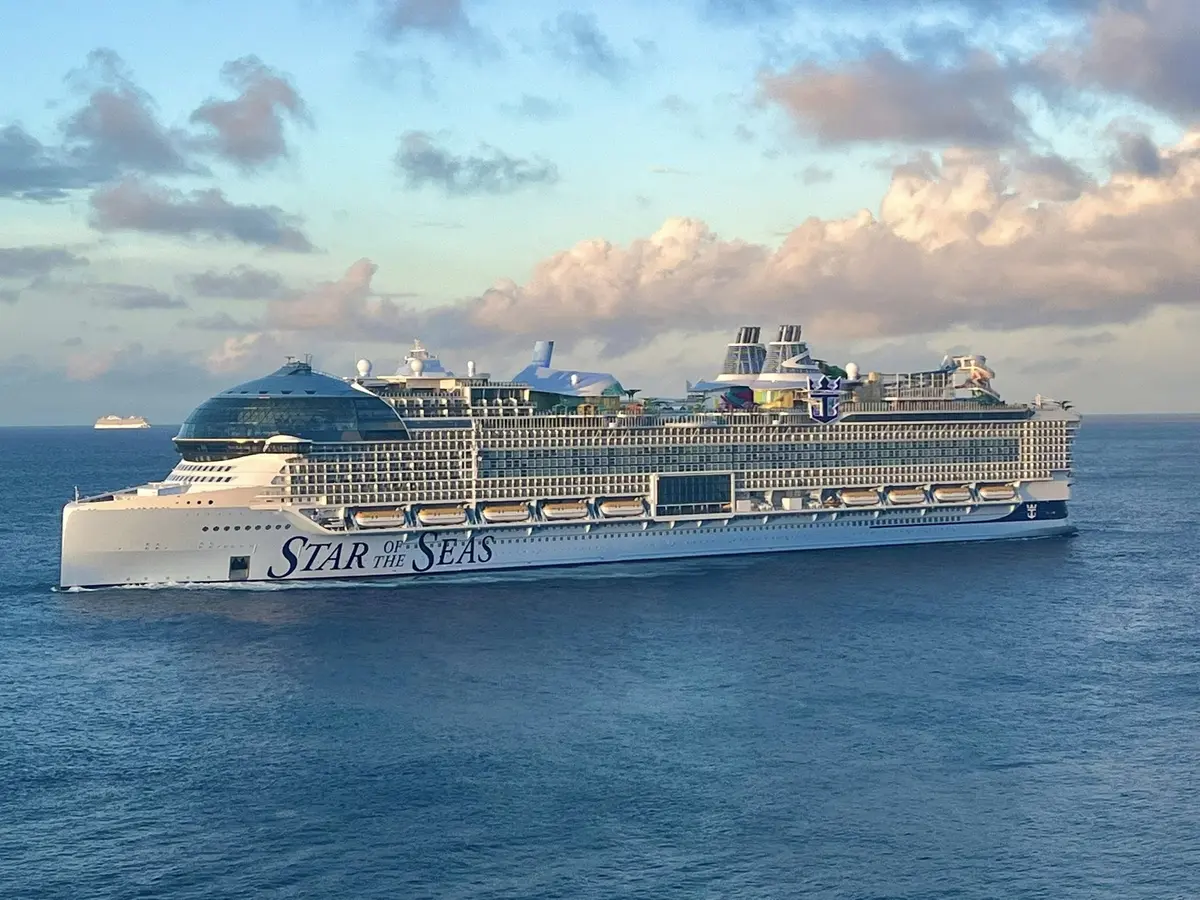
It's so important to speak up and get your cruise the way you want it by asking 7 questions.
Some of these questions are said out loud, and others are ones you should be asking yourself.
Asking all of them will likely get you a better cruise overall.

The first day of a Royal Caribbean cruise is busy, but we have an easy guide to what to expect on embarkation day.
From check-in to muster drill to dining reservations, there's plenty happening and it can feel overwhelming for a new cruiser.
Luckily, Royal Caribbean makes the process quite easy but knowing what to expect can make it a lot more manageable.

The 596th episode of the Royal Caribbean Blog Podcast is now available, where Matt is asked if an old ship will be disappointing.
Many cruisers are hesitant to try an old ship because they're worried it won't be nearly as good as a new ship.
Please feel free to subscribe via YouTube, iTunes or RSS, and head over to rate and review the podcast on iTunes if you can! We’d appreciate it.
Spring break is one of the most in-demand cruise periods of the year. After a winter full of cold, wind, and snow, a lot of families want to escape to a warm tropical vacation.

Royal Caribbean cruises are in high demand in March and April because schools have built-in time off, and that leads to more families cruising. Suffice to say, there's a lot of other people looking to book a spring break cruise.
The good news is you can still book a spring break cruise, but you're going to need to be strategic about it and act quickly.
However, you'll need to have a degree of flexibility because with just a few weeks to go, there are fewer choices, and higher fares than if you booked last year. Nonetheless, it's still doable!
I'm here to help you work in a spring break cruise, provided you can take advantage of these five steps.

Before you read all of the best tips for finding a last-minute spring break cruise, here are the best options that most people overlook and are still available to book:
Prices were accurate as of the publishing of this article, but they could change quickly.
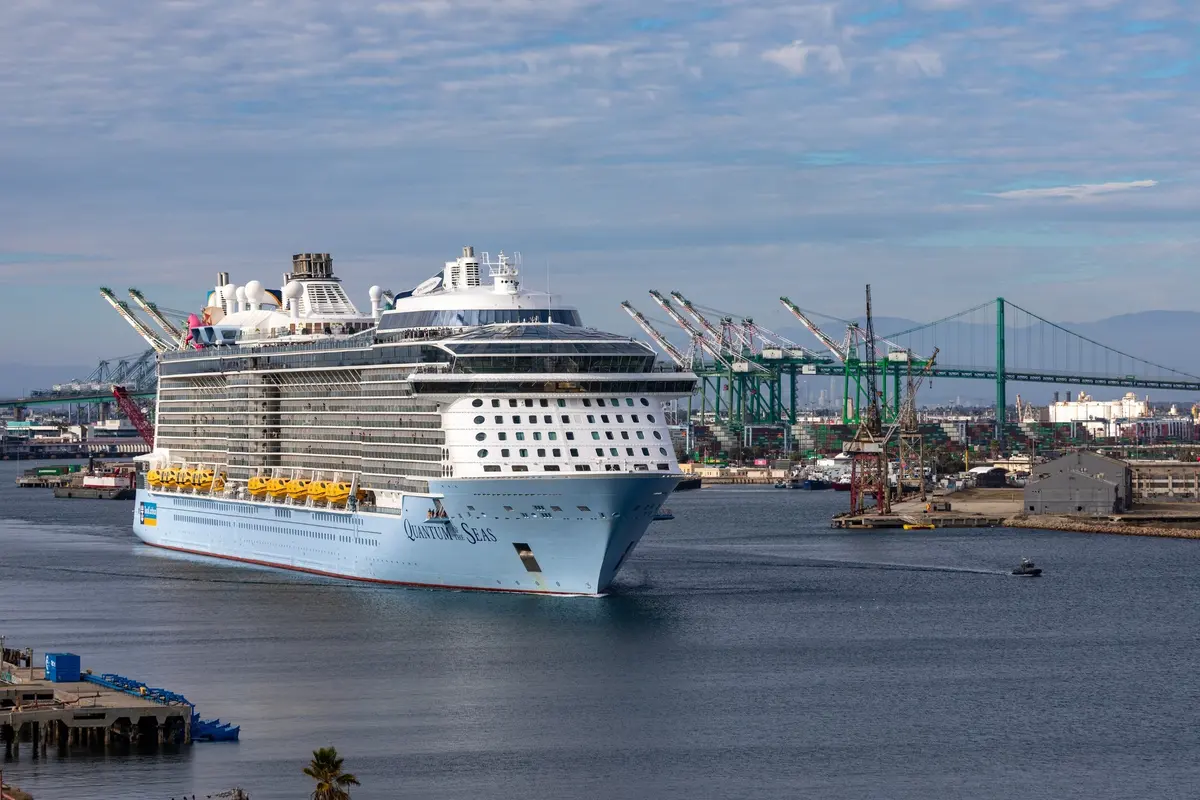
The first problem you may run into is trying to shoehorn in a cruise that fits exactly with the week you have in mind.
A lot of schools have the same time off, so if you have the ability to travel another time, that might work out better.
The most popular spring break weeks this year are:

Here are a few tips for finding a cruise that skirts around these in-demand times:
Not everyone can take advantage of these tips, but if there's any wiggle room, you may find better options.

If your first instinct is to find a cruise sailing from Florida, you should widen your search to find even better options.
I find most people only check one homeport because that's what they're used to, and that kind of tunnel vision can lead to limited choices.
Instead, this might be the year to try a spring break cruise from one of these alternative ports:

In my experience, drive-to ports still sell out fastest and most of those are in Florida.
If you want the "cheat code" to finding a good last-minute spring break cruise, I'd start with a west coast cruise from LA. These always seem to be the cheapest sailings and have the most inventory.
Cruises from Galveston tend to be another good choice because Texas isn't quite as drive-to as Florida.
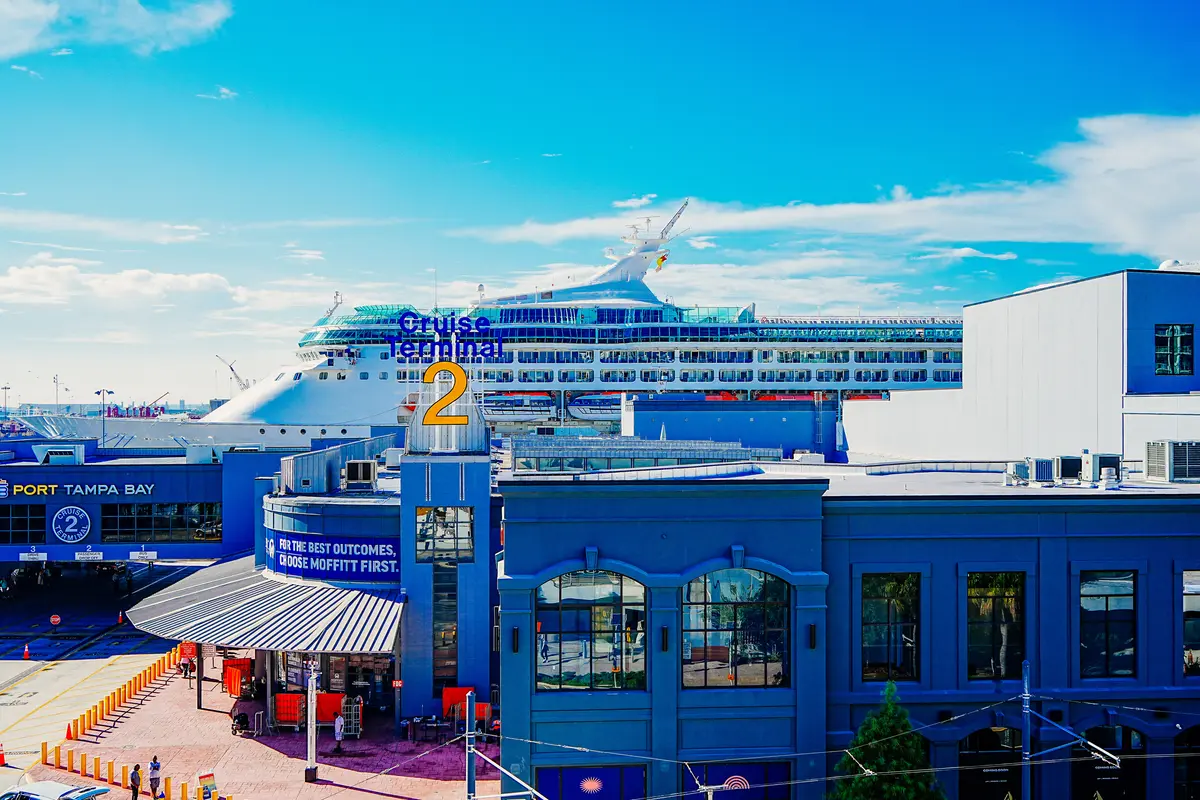
If Florida is your best option, then I'd look for a cruise to Tampa. Ships based here tend to be smaller and older because bigger ships cannot access the port.
Here are the ships you should be targeting because they're likely going to still be available and priced reasonably:
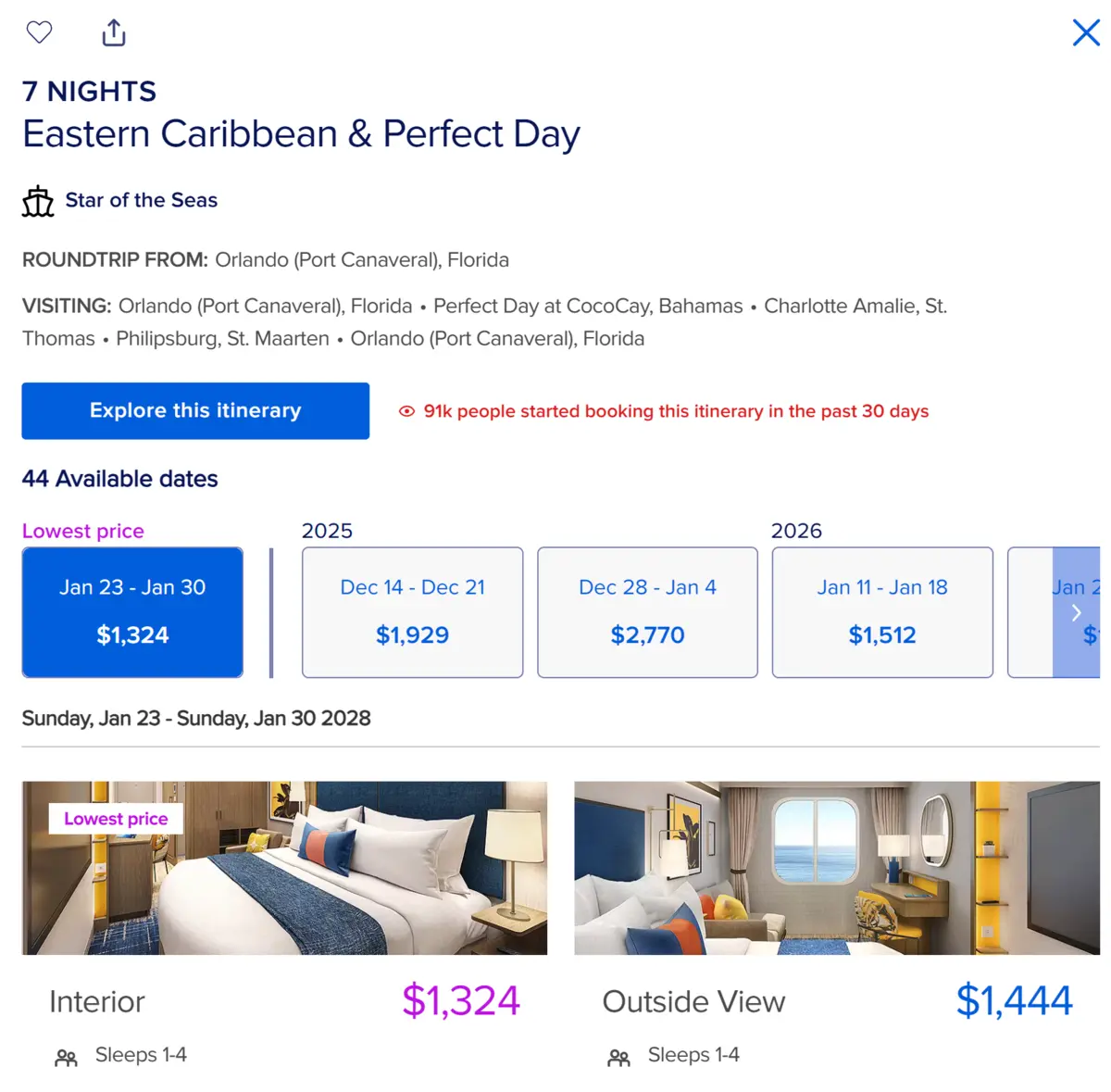
It's tempting to sort cruises by lowest price first, but the cheapest sailings will sell out first.
When you're in the market for a last-minute cruise, I find mid-range itineraries sometimes have more availability. Cruises that are 4- and 5-nights in length tend to evade top searches because weekend and 7-night cruises are the most popular spring break cruises.

Another mistake with shopping by price is waiting for a "deal" rarely works in spring break. It's just too in demand.
Royal Caribbean uses dynamic pricing for its cruises, which means the more the demand, the higher the prices go up.
If you spot a cruise that within your budget, I'd jump at the chance before the price goes up or the cabin sells out. Or both.
Starting your cruise search off with a balcony cabin might limit your choices, so instead try another category that could yield more options.
Oceanview rooms are a great alternative because you still get outside light and a view, but it lacks the access to the outdoors.
If that seems like a compromise, remember that you'll be out and about enjoying everything your ship has to offer. So having a balcony is nice, but not critical.

Another idea is to roll the dice with a guarantee cabin, where Royal Caribbean picks your cabin.
Guarantee cabins usually result in being assigned either an unsold cabin or a room that gets cancelled at the last-minute. That doesn't mean it will be necessarily the worst room on the ship, but it's a great choice for saving money. However, it definitely favors someone that doesn't get easily seasick and has a sense of adventure with their room choice.
The room category you can pretty much give up on finding are suites.
There are so few of them to begin with, and demand is usually quite high. The only chance might be an unsold Junior Suite or one of the very expensive suites that has such a high price tag it's given others pause before booking it.

Once you find a spring break cruise, be sure to quickly book a flight and a pre-cruise hotel stay, because those aren't getting any cheaper either.
Just like cruises, airfare spikes quickly during spring break. In fact, this might be the time to cash in those credit card points to redeem a flight.
Speaking of flights, be sure to book your flight to fly in at least one day before your sailing begins. Never risk traveling the same day your cruise sails, because it's a mistake waiting to happen.
Hotels are also difficult because you're competing with everyone that wants a hotel for a land-based spring break vacation.
My advice is to look for hotels near the airport and well-away from the beach. It might mean a longer Uber ride to the port, but you'll probably pay a lot less for the hotel.

If you want a cruise this spring break, do this today:
✅ Search flexible dates
✅ Check multiple departure ports
✅ Be open to interior or guarantee cabins
✅ Book flights immediately after
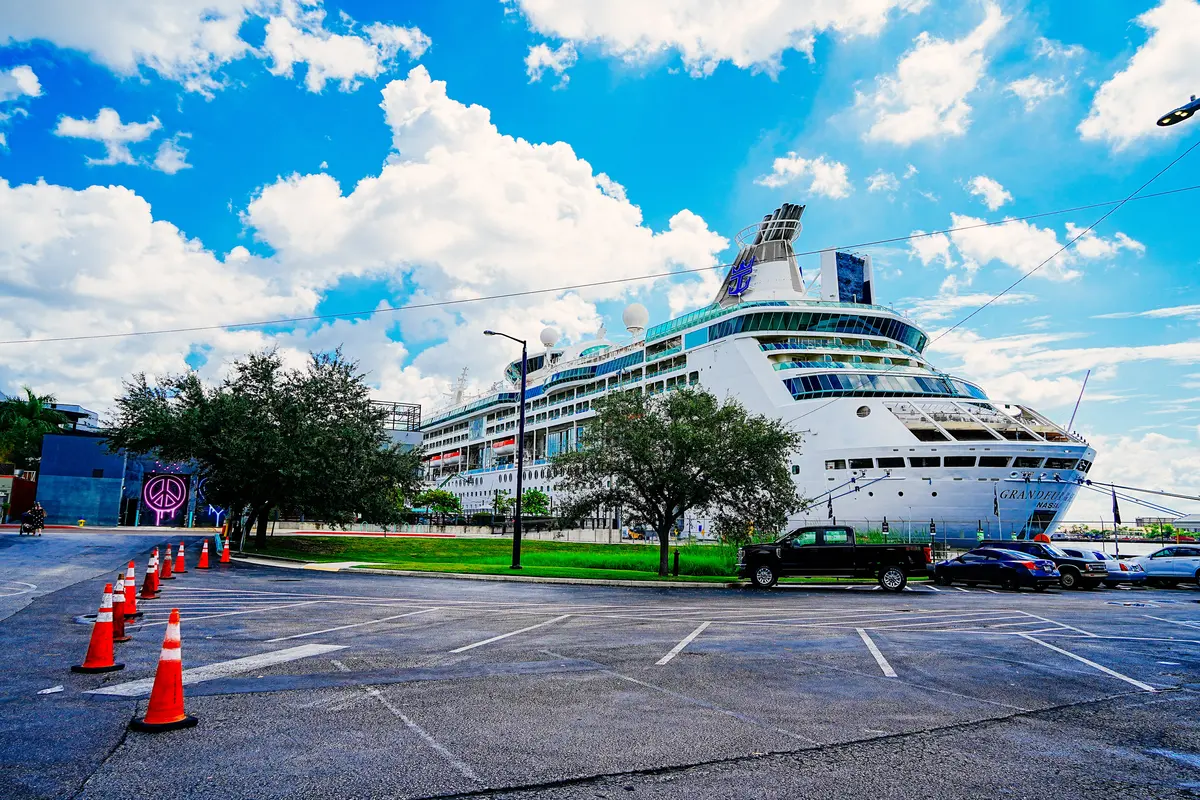
It's not too late to book a spring break cruise, but you'll want to act quickly. Prices are only going up and more cabins will be sold out.
Real talk: every spring break cruise will sell out and the ships will sail full. Royal Caribbean won't have any problem selling them, given how they've explained recently close-in demand has been really strong for them.
I'd focus less on it being the absolute perfect ship and itinerary, and instead look for an opportunity to enjoy a warm, well-deserved break from your daily life.
Recently, I took a weekend cruise on one of Royal Caribbean's newest and biggest ships, and I tried to keep my costs down since it was I was going solo.

I think it's possible to cruise on a budget, or at least a loose one.
I was invited to go on a "guys cruise" with some friends for a weekend in January. I took it as a challenge to try to make the trip happen without spending as much I would if this were a family vacation.
Between the cruise fare, excursions, dining, and Wi-Fi, I spent about
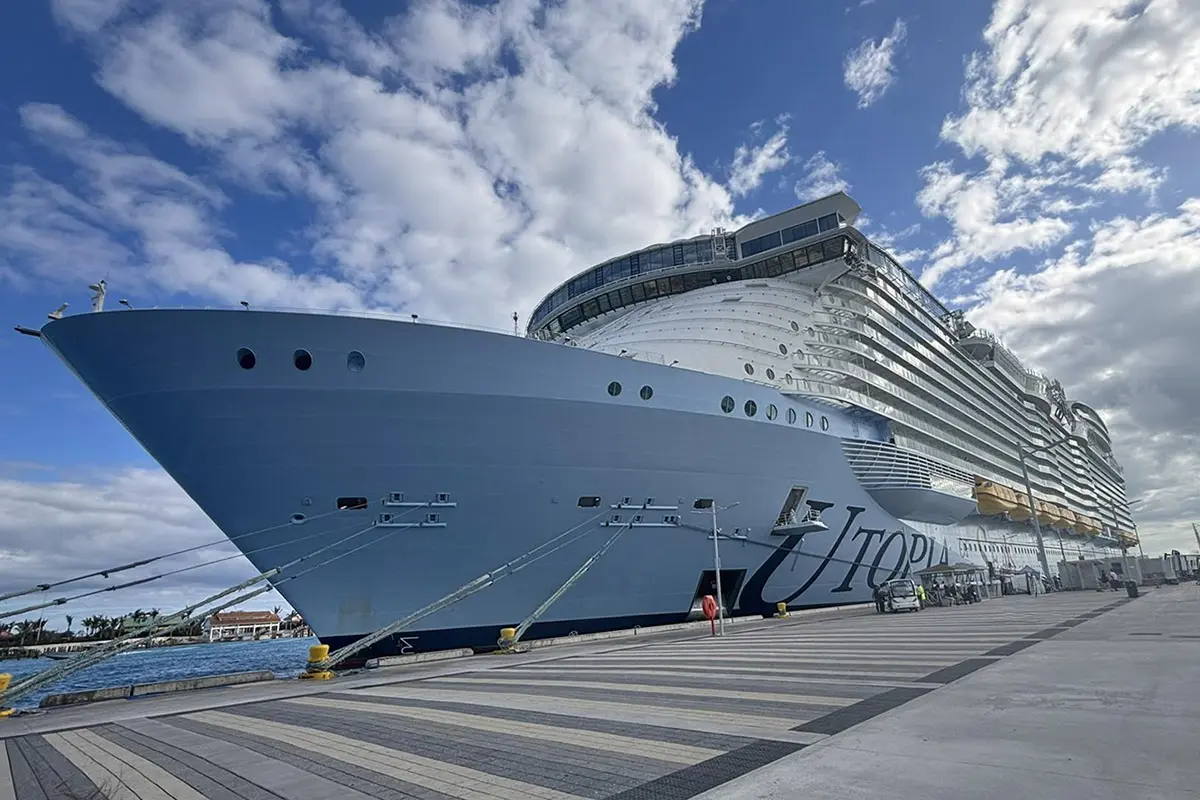
I think Royal Caribbean's casino offers are the best value in cruising right now, but getting an offer can be tricky.
A couple of months before the sail date, I got an offer in the mail for this three-night cruise on Utopia of the Seas.
Since Utopia is based from Port Canaveral, this meant I could drive to the cruise port and not have to fly.
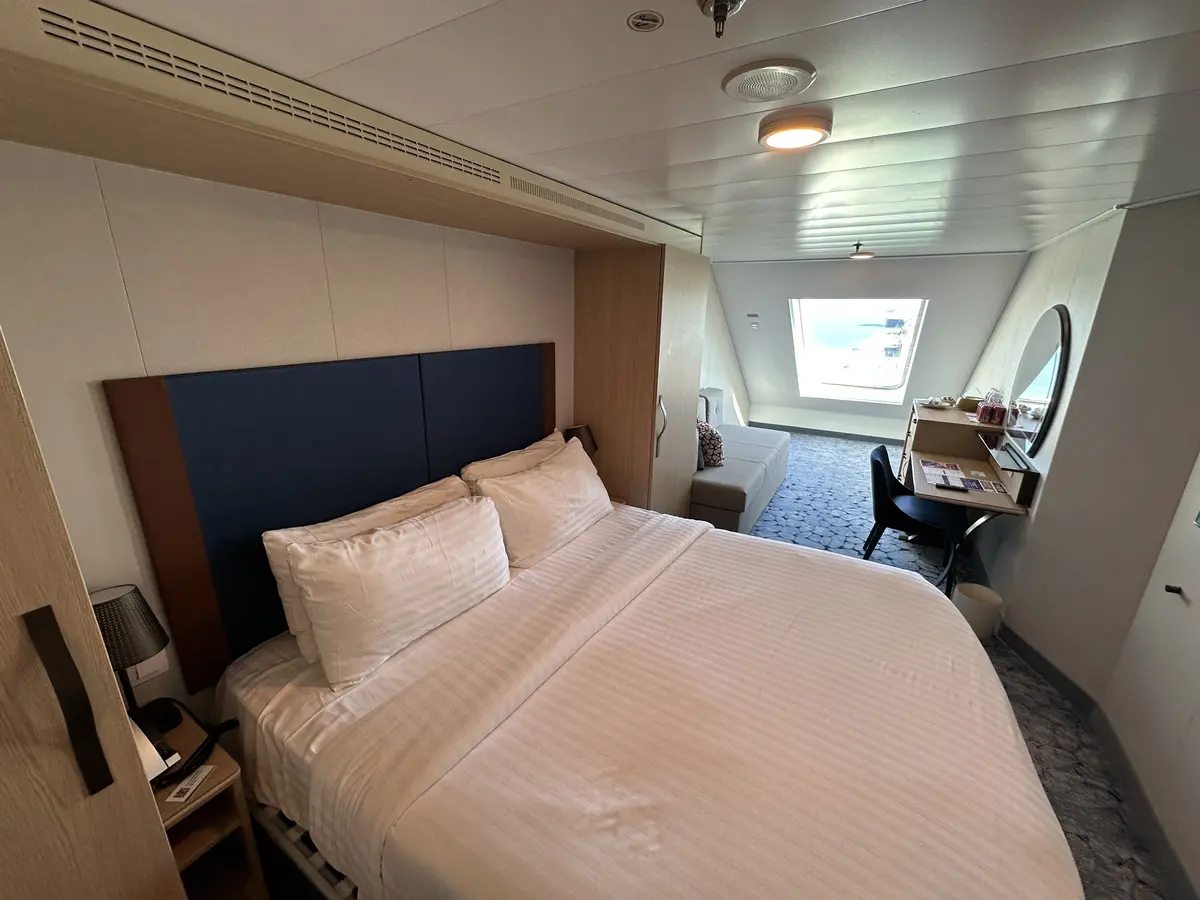
The offer was for a "free" oceanview cabin, but it wasn't free overall. I still had to pay port fees, taxes, and gratuities for the room. The total cost was $685.13.
And yes, nothing is truly free from the casino. I paid money on other cruises to qualify for a complimentary cruise offer. I think it would be disingenuous of me to pretend otherwise.
I was assigned an forward-facing oceanview cabin that had a very interesting layout. It was located at the very front of the ship, which I later discovered wasn't ideal.

Not only was it a long distance to walk to and from, but the amount of vibrations from the ship docking every morning would jolt me awake every time.
I napped to make up for the lost sleep, but I'd pick a cabin in another location next time. Ideally, much closer to midship.

One of the best perks of having made it to Pinnacle Club status is I get a complimentary one device internet package every sailing.
For most people, this is all they would need. But because I'm working from the ship, I need to use internet on my phone and laptop. When I swap from my phone to my laptop, I don't get phone calls or text messages until I swap back. That's been a source of frustration.
Usually I pre-purchase a second internet package to take advantage of the pre-cruise savings. For some reason, I completely forgot to do that this time.

I could have paid for a package on the ship, but the onboard prices are quite high when compared to the pre-cruise discount.
I was annoyed at myself for not buying it, and ultimately relied on just one package. Since it was just 3 nights and over a weekend, I figured my work needs would be limited.
Next time I will double check my pre-cruise purchases the week before my sailing begins so I don't overlook something I assumed I had bought.
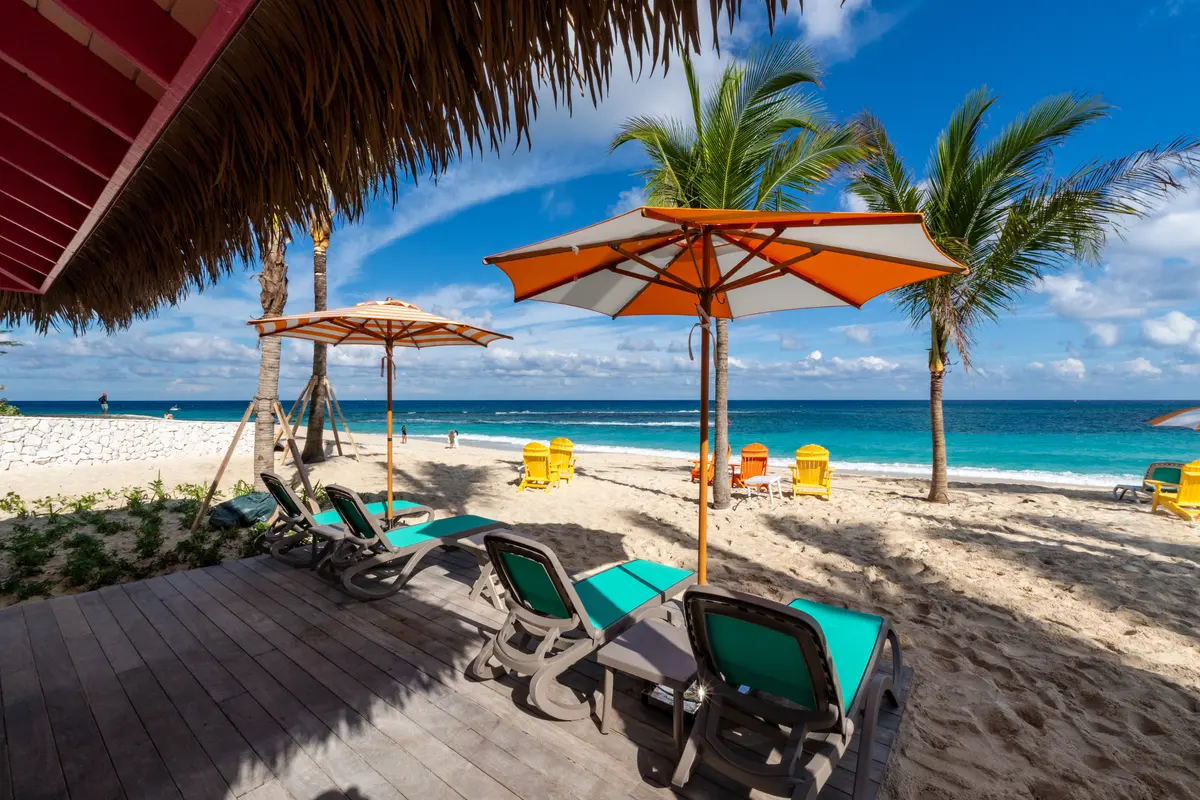
I may have booked this cruise with the notion it would be a "guys cruise", but it doubled as a research opportunity to visit the new Royal Beach Club.
Thanks to a Black Friday sale discount, I was able to get the unlimited alcohol day pass for $136.99 when I pre-purchased the pass. This saved me paying the listed onboard price of $250.00.
For the price I paid, I thought it was well worth the admission cost. Unlike Perfect Day at CocoCay, the beach club felt more like a shore excursion and I loved how good the service was throughout the day.
I can't wait to bring my family here in April when we return, and thanks to my pre-cruise purchasing strategy, I've found a much better price at just $89.99 per person!

I could have saved money if I paid to park off site, but I'll always pay to park at the cruise terminal.
Being able to go right into the terminal and then back to my car when the cruise is over without dealing with a shuttle is worth every dollar.
I paid $85.60 for the ability to park at Port Canaveral.
As advertised, it was easy to get in and out, and I was grateful to not add any fuss to my pre- or post-cruise logistics.

On a whim, I went back to Hooked Seafood to give it another try because I had skipped this specialty restaurant for many years.
As it turned out, Hooked was much better than I expected and I regretted not re-trying Hooked again sooner.

The onboard price of dinner at Hooked is $65, which is a good reminder to either pre-purchase a meal before the sailing or buy a dining package.
Either of those strategies should cut the price significantly. As an example, dinner at Hooked for Utopia of the Seas in April costs $41.99 with the current sale that's offered.
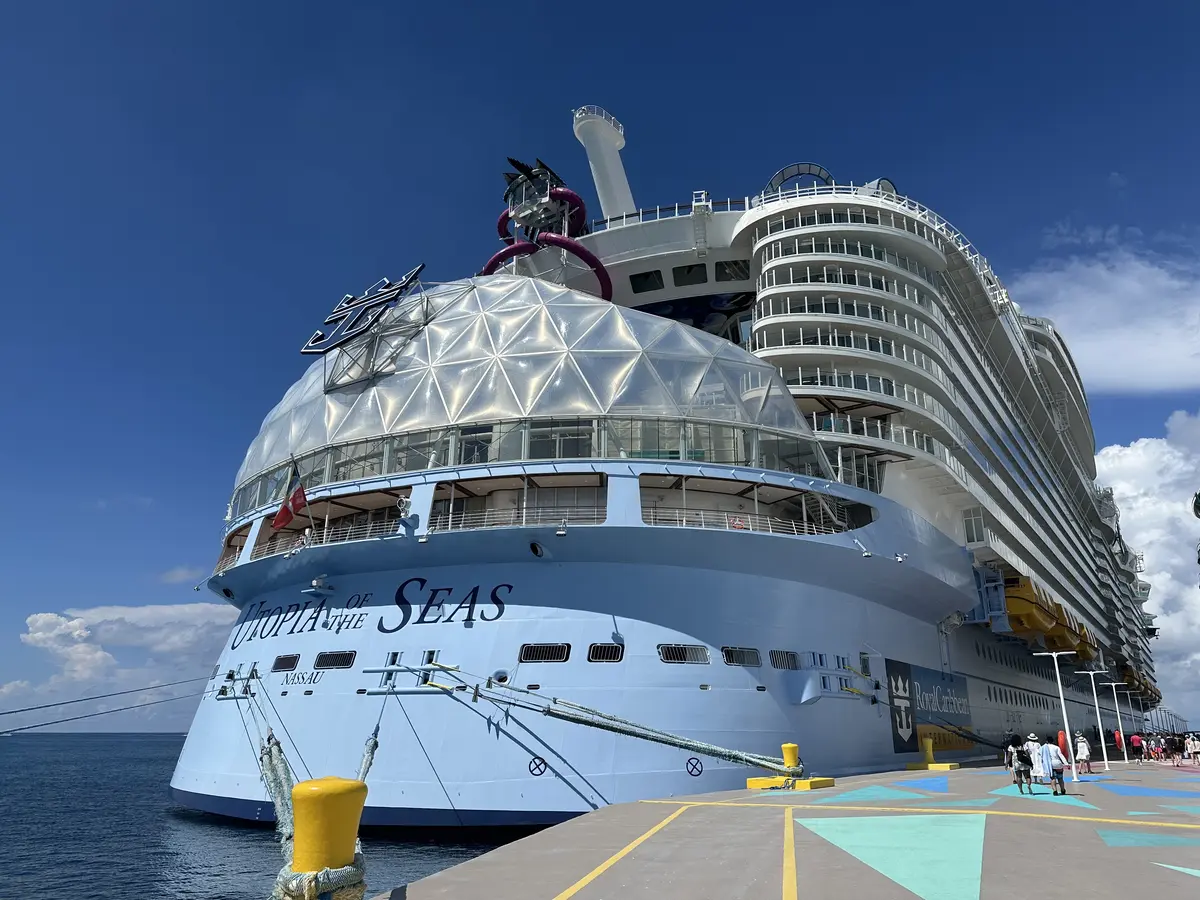
Our last day was spent at Perfect Day at CocoCay, which is a private island exclusive for Royal Caribbean guests.
I love how much of the island's experience is included in your fare, so I didn't feel any pressure to spend more on the extra-cost areas.
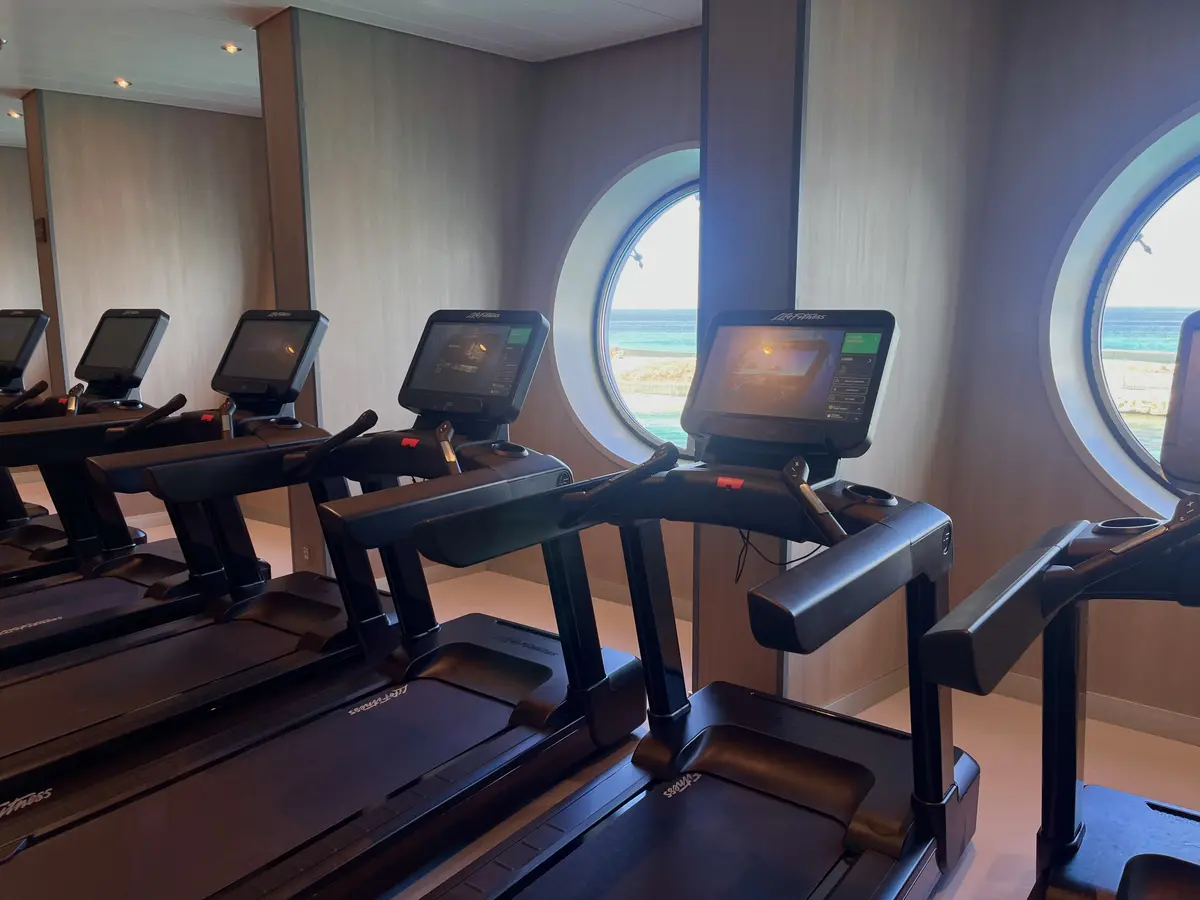
Before disembarking the ship, I went to the fitness center and enjoyed the gym. There's no cost to use the fitness center, and it's so much better than my gym at home.
There's no cost to access CocoCay, and there are a number of included beaches and restaurants.
Read more: The cheapest way to do Perfect Day at CocoCay without missing out
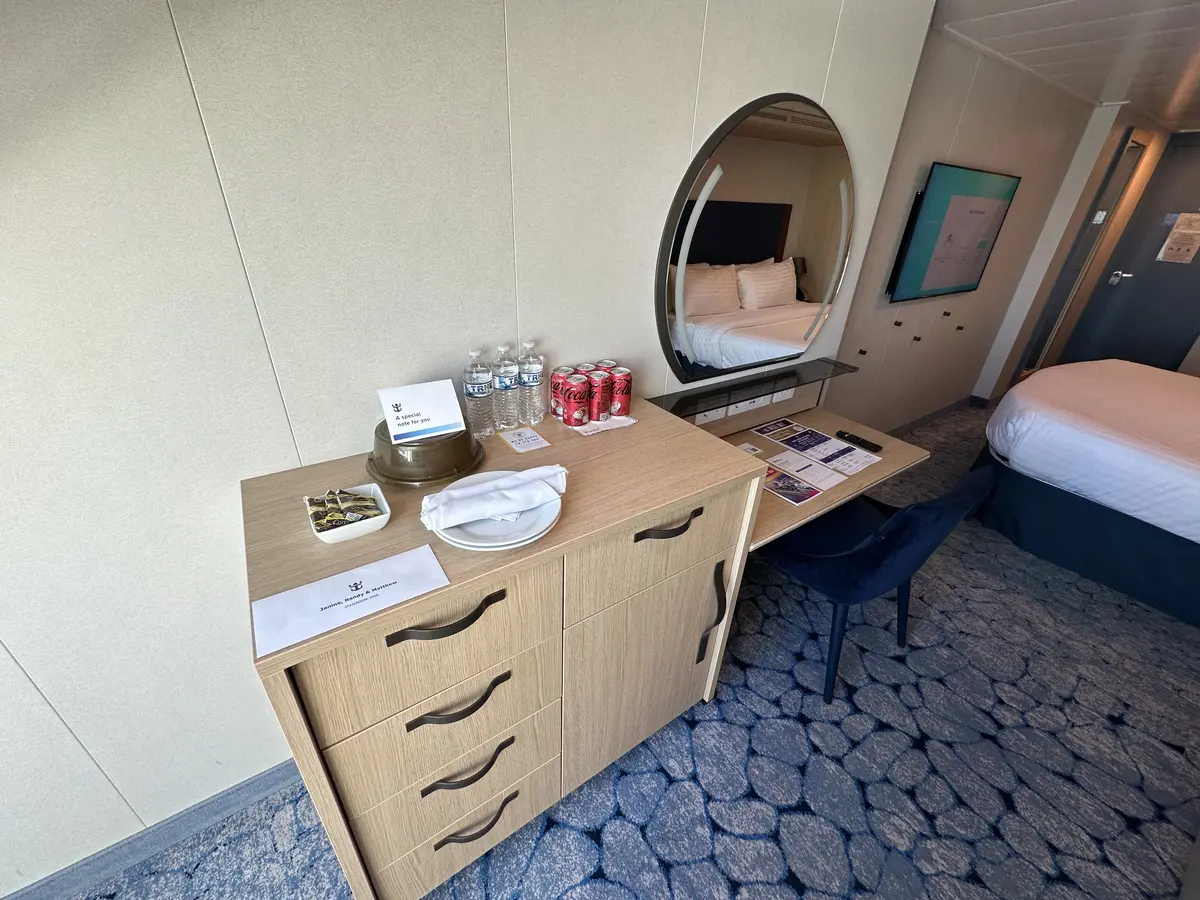
Part of the secret to spending less on a cruise is taking advantage of the perks Royal Caribbean offers its loyal guests.
I had 6 drink vouchers to use every day because I'm a Pinnacle Club member. It was an easy decision to forgo buying a beverage package and rely just on those drinks.
As a Prime level member in Casino Royale, I also had unlimited free drinks while at the casino bar. Combined with the drink vouchers, this is an incredible savings.
In my cabin, I found a few cans of soda and bottled water because it's one of the Diamond Plus amenities you can choose to have.
There's no question being loyal to Royal Caribbean gets me a lot of extras that I would have otherwise to pay for. Plus, it's an added incentive to cruise more.

I had a great time going to The Bahamas for the weekend, and I think I managed to do it all without spending a lot.
The total cost was just $972.72, which was greatly the result of a casino rate and a lot of loyalty perks.
Not everyone can take advantage of either of these options, but I think it illustrates the potential for cheap cruising with the right strategy. I would never advocate gambling to earn status or cruising to move up the Crown and Anchor ladder faster because overall, it would probably cost you more in the long run.

However, when the situation aligns better to allow you to take advantage of a situation like I had, then I think there's a good potential for a cheap weekend cruise.
I could have spent more and gotten a better cabin location. In fact, I would do just that next time. I doubt I would take a room at the very front of the ship again because of the noise and movement issues there.
I also should have remembered to double check my pre-cruise bookings to ensure I have everything I expect booked before the cruise begins.